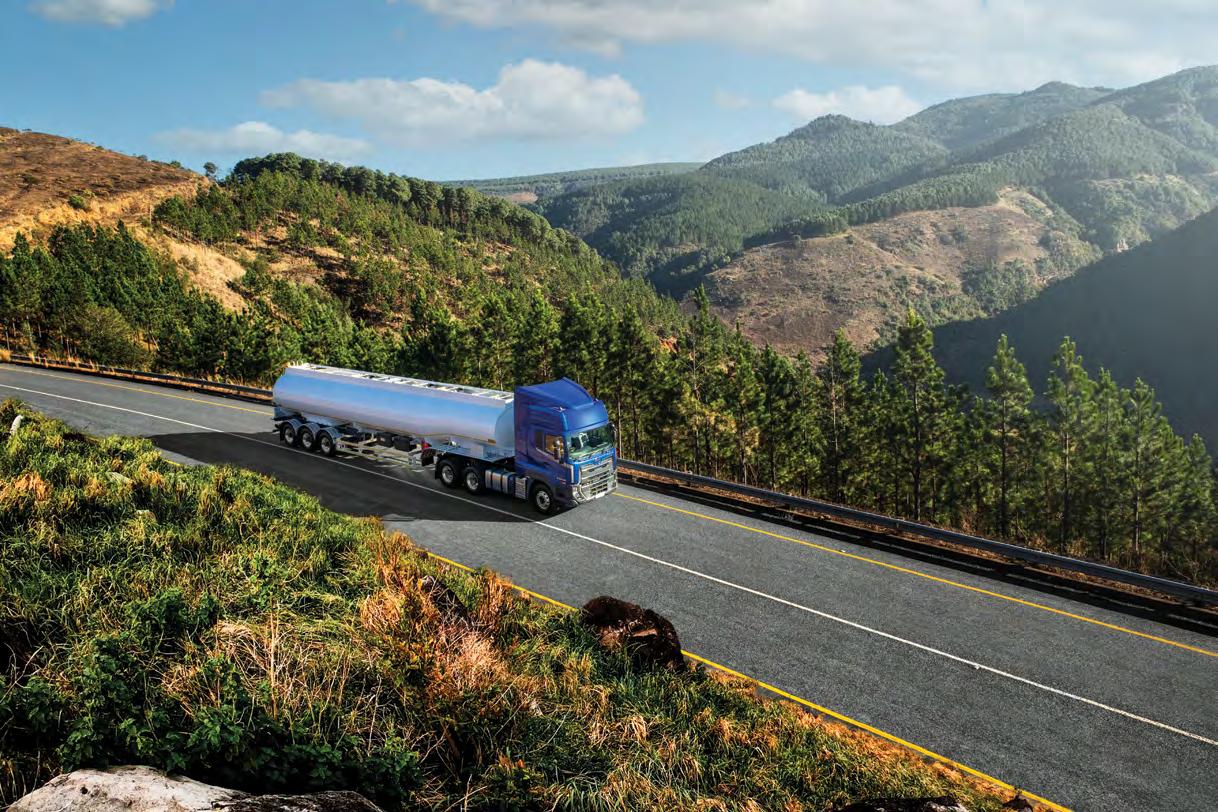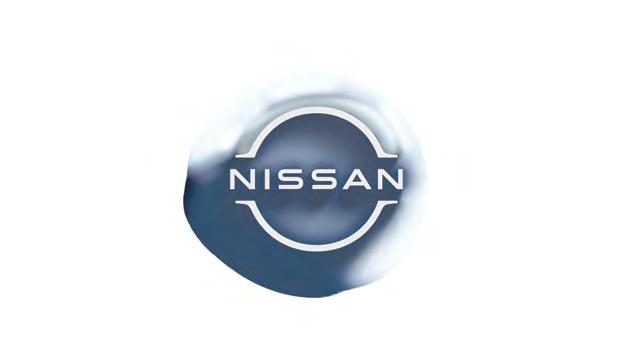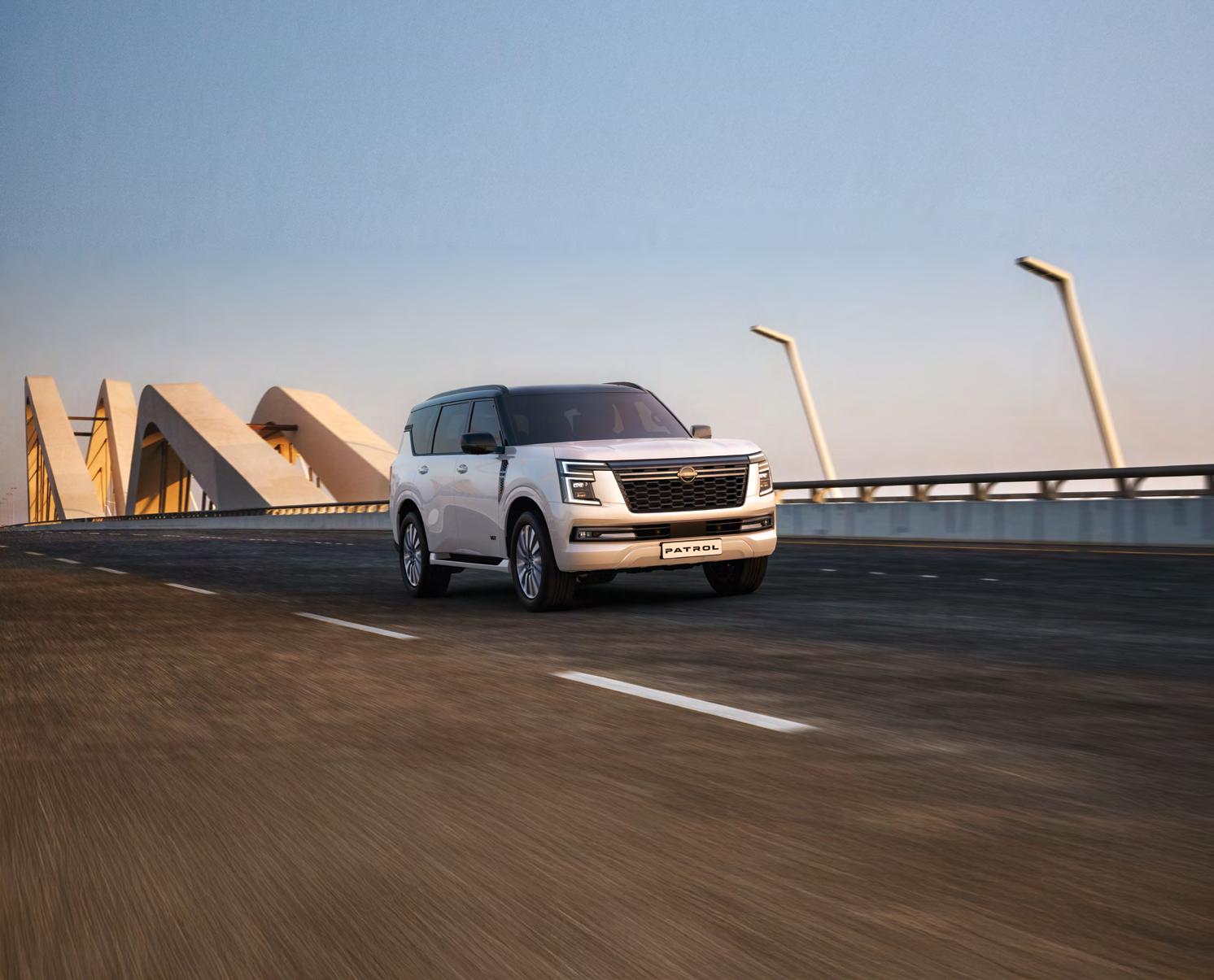LAST-MILE
The E-Commerce Race

CONNECTING TRADE PROFESSIONALS WITH INDUSTRY INTELLIGENCE
MARITIME
Aligning with Global Standards
INTERVIEW
Invisible Shields

LAST-MILE
The E-Commerce Race

CONNECTING TRADE PROFESSIONALS WITH INDUSTRY INTELLIGENCE
MARITIME
Aligning with Global Standards
INTERVIEW
Invisible Shields
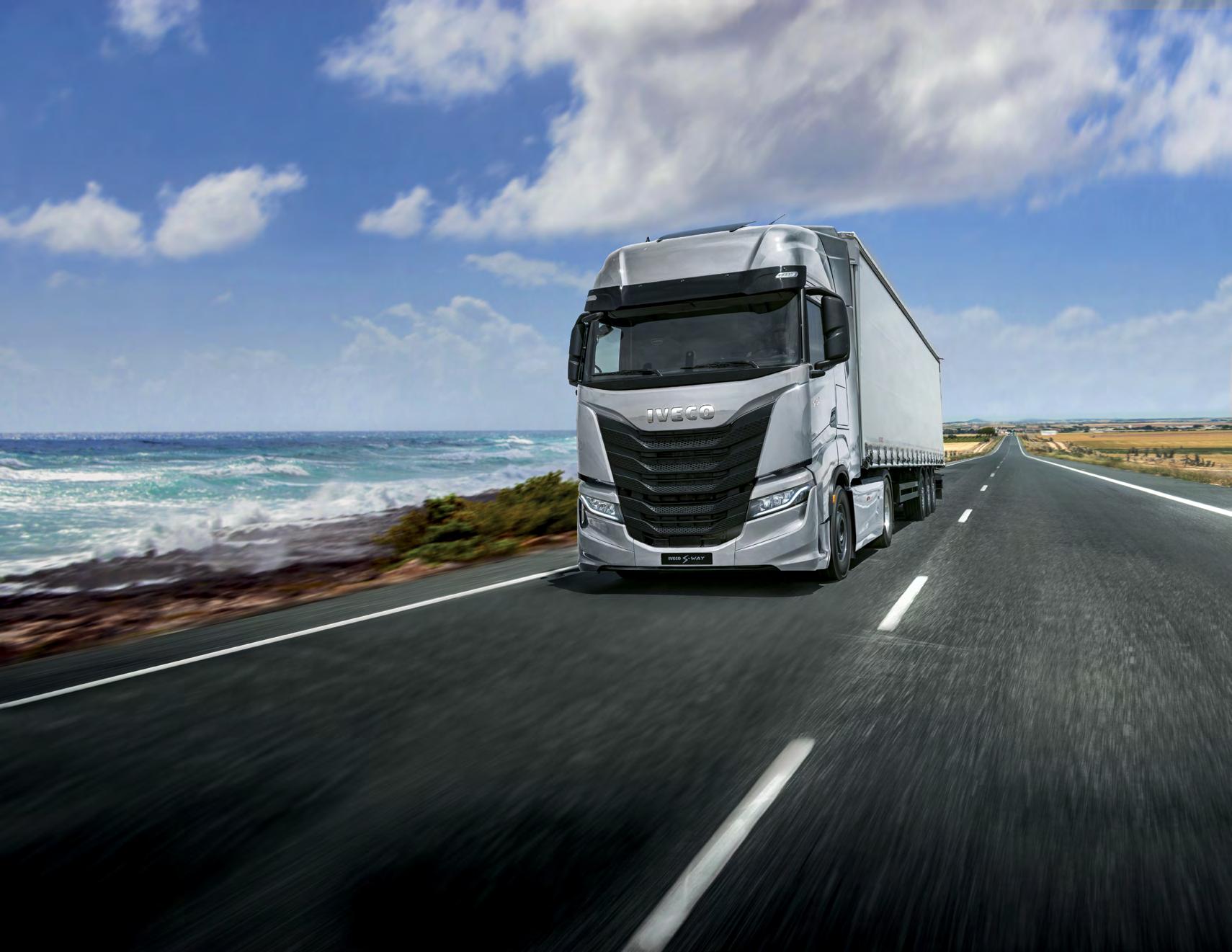
New IVECO S-Way: high technology and efficiency on all missions
A wide choice of Euro III / V diesel engines, delivering class-leading power from 360 hp to 560 hp Euro III / 570 hp Euro V and superior fuel economy. 12-speed HI-TRONIX automated transmission with the most advanced technology in its category, electronic clutch and best-in-class torque-to-weight ratio. Full range of fuel-saving devices, such as anti-idling feature, EcoSwitch, Ecoroll and Smart Alternator. Top levels of comfort and safety, with a completely redesigned and reinforced cab, featuring enhanced direct visibility and enlarged cab livability.
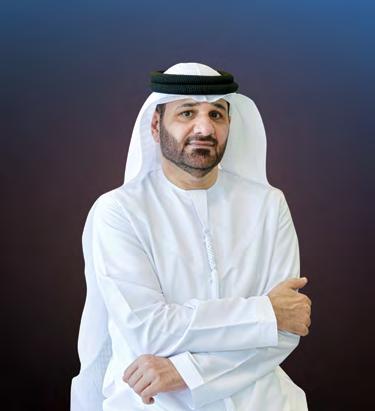


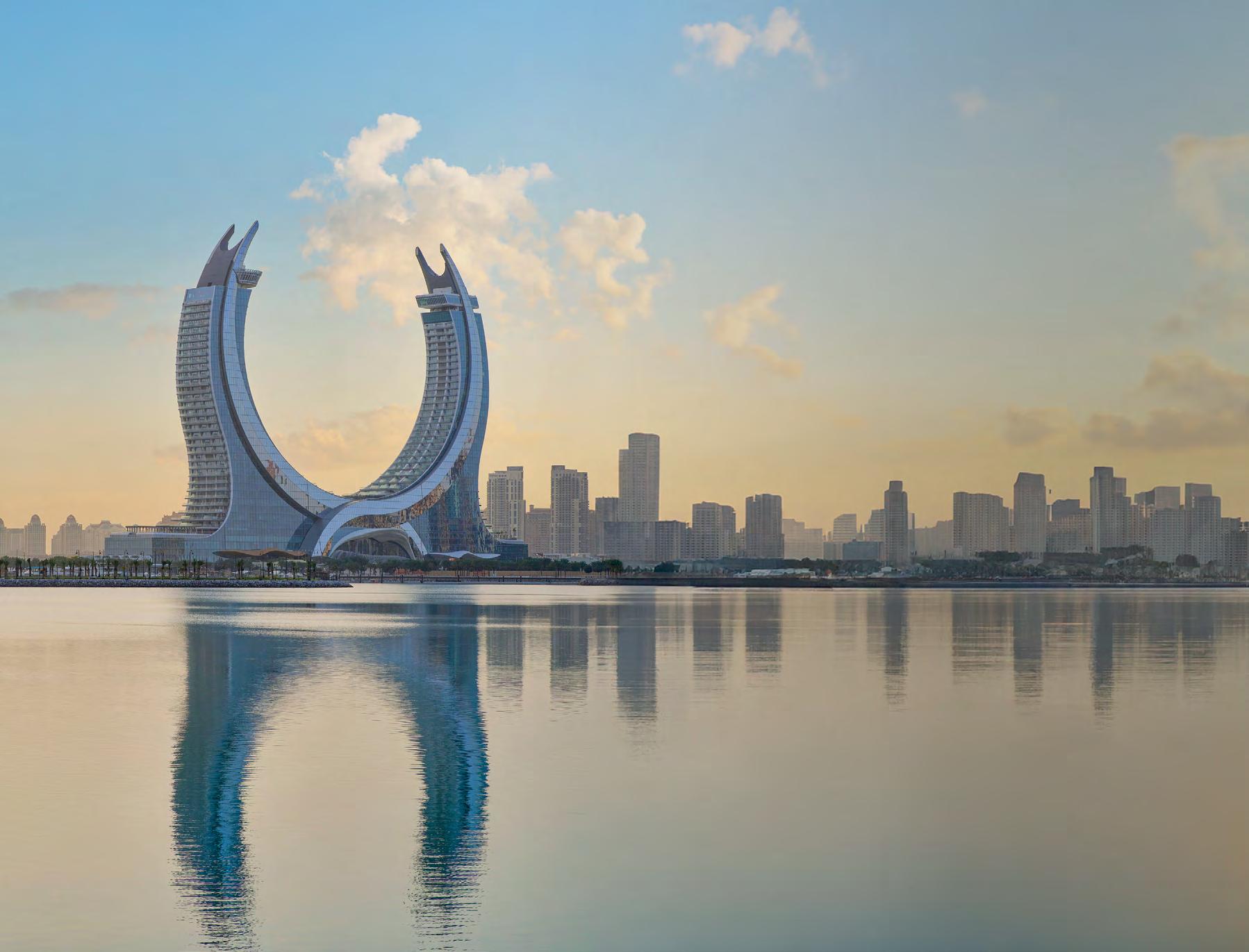
Nestled by the coast of Lusail sits the splendor of Raf es and Fairmont Doha, where luxury is rooted in even the smallest details. Open the doors to mesmerizing hospitality and make memories in a world of sophistication.

CONNECTING TRADE PROFESSIONALS WITH INDUSTRY INTELLIGENCE
CEO
Wissam Younane wissam@bncpublishing.net
Managing Director
CEO
Rabih Najm rabih@bncpublishing.net
Wissam Younane wissam@bncpublishing.net
Group Publishing Director
Director
Joaquim D’Costa jo@bncpublishing.net
Rabih Najm rabih@bncpublishing.net
Commercial Director
Group Publishing Director
Andrea Mocay andrea@bncpublishing.net
Joaquim D'Costa jo@bncpublishing.net
Editor-in-Chief
Editor-in-Chief
Vibha Mehta vibha@bncpublishing.net
Vibha Mehta vibha@bncpublishing.net
SUBSCRIBE subscriptions@bncpublishing.net
PO Box 502511 Dubai, United Arab Emirates P +971 4 4200 506 | F +971 4 4200 196
Editor Aya Zhang aya@bncpublishing.net
Managing Editor
Kasun Illankoon kasun@bncpublishing.net
Digital Reporter
Reeba Asghar reeba@bncpublishing.net
Design Christian Harb
Creative Lead Christian Harb chriss@bncpublishing.net
Marketing Executive
Aaron Joshua Sinanbam aj@bncpublishing.net
Editorial Design
Digital Media Producer
Rizaldi Febrian
Alexander Bungas
Marketing Executive
Aaron Joshua Sinanbam aj@bncpublishing.net
Videographer
Eduardo Buenagua
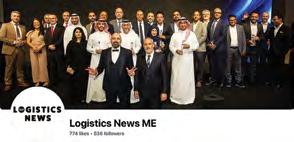
For all commercial enquiries, contact jo@bncpublishing.net T +971 50 440 2706
subscriptions@bncpublishing.net PO Box 502511 Dubai, United Arab Emirates P +971 4 4200 506 | F +971 4 4200 196
All rights reserved © 2025. Opinions expressed are solely those of the contributors. Logistics News ME and all subsidiary publications in the MENA region are officially licensed exclusively to BNC Publishing in the MENA region by Logistics News ME.
For all commercial enquiries, contact jo@bncpublishing.net T +971 50 440 2706 All rights reserved © 2023. Opinions expressed are solely those of the contributors.
No part of this magazine may be reproduced or transmitted in any form or by any means without written permission of the publisher.
Printed by United Printing and Publishing | upp.ae
Logistics News ME and all subsidiary publications in the MENA region are o cially licensed exclusively to BNC Publishing in the MENA region by Logistics News ME. No part of this magazine may be reproduced or transmitted in any form or by any means without written permission of the publisher.
Printed by United Printing and Publishing | upp.ae
Images used in Logistics News ME are credited when necessary. Attributed use of copyrighted images with permission. All images not credited courtesy Shutterstock.
In addition to our print edition, we’re bringing you all sorts of industry news on our web mediums. We’re looking forward to interacting with our readers on all of our social media and web platforms. See you on the web!
addition to our we’re bringing you all sorts of industry news on our web mediums. We’re looking forward to interacting with our readers on all of our social media and web platforms. See you on the web!
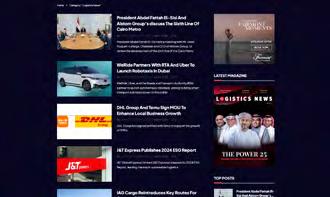
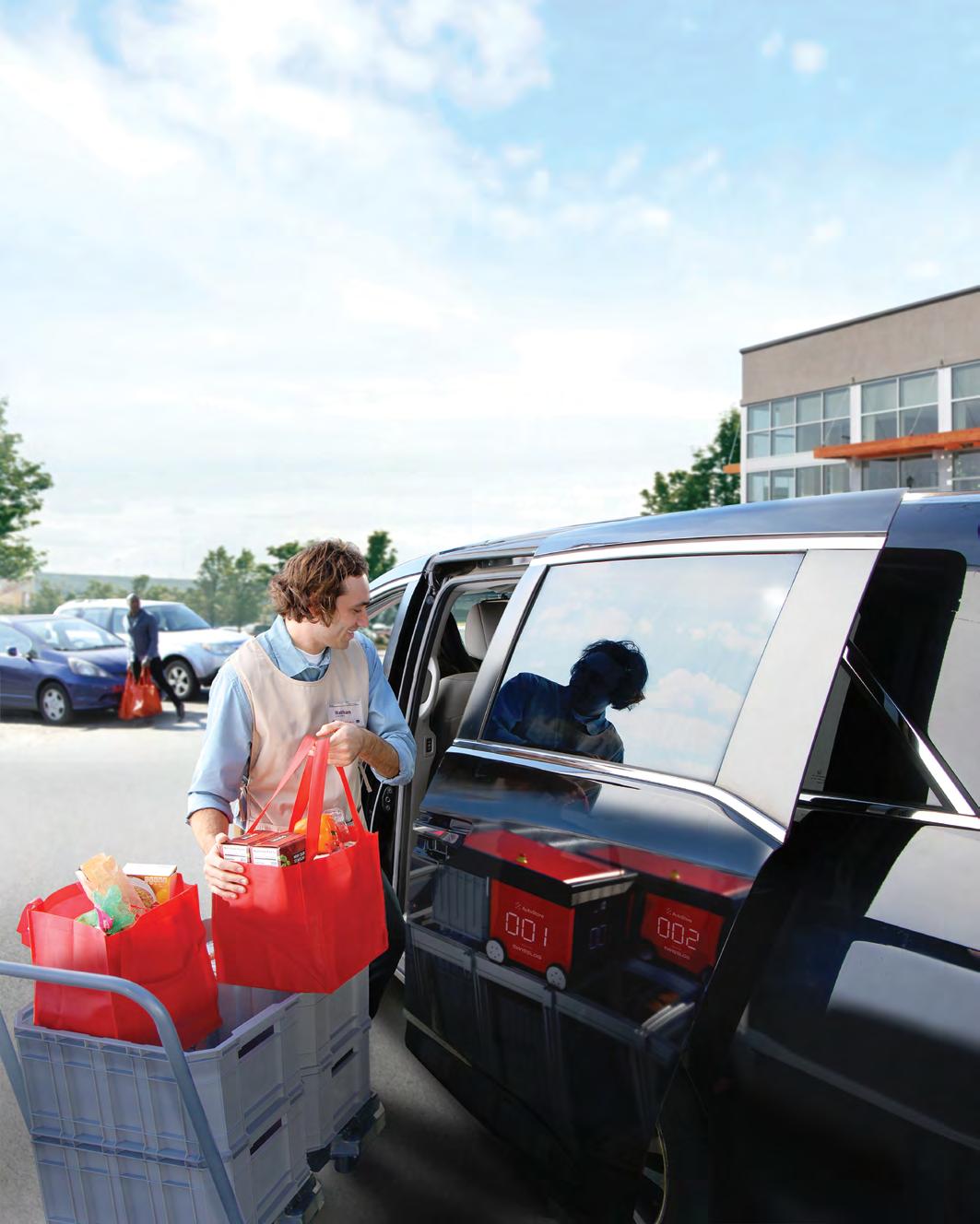
EDITOR’S NOTE

Ioften find myself overwhelmed when reflecting on the times we live in, we are in an era of remarkable change, innovation and opportunity. Advancements in technology, science, medicine, and many other aspects have created a landscape where progress is tangible and the future holds incredible potential.
Take technology, for example. A few decades ago, the innovations we now take for granted seemed unimaginable. The digital revolution has connected the world, making information and opportunities accessible at the click
of a button. The smartphone, once a luxury, is now an essential tool for communication, education, and entertainment. Artificial intelligence, virtual reality, and automation are reshaping entire industries, creating new possibilities for work, creativity, and connection.
We are now more connected to one another than ever before. Global communication, collaboration, and exchange of ideas are constant, and we can learn from and support people all over the world. The diversity of thought, culture, and perspective is one of the greatest strengths of our time.
The logistics world is no exception. We are witnessing an exciting transformation, driven by breakthroughs in automation, AI, and real-time tracking. Warehouses are becoming automated hubs, and autonomous vehicles are beginning to streamline delivery systems. AI and machine learning optimise supply chains and delivery routes, while drones may soon become a common sight in last-mile deliveries. The list of examples is endless.
What I am getting at is: the world has never been as convenient and full of potential as it is today. All of these tools and advancements are doing us a great service, helping us reach higher standards and build greater legacies. We have more tools, more knowledge, and more unity than ever before, and we need to take advantage of this. Now is the time to capitalise on all the opportunities we have been given, and to shape a legacy that will define this extraordinary era.
Aya Zhang Editor aya@bncpublishing.net
Xiaoyue (Aya) Zhang xiaoyuezhangg






























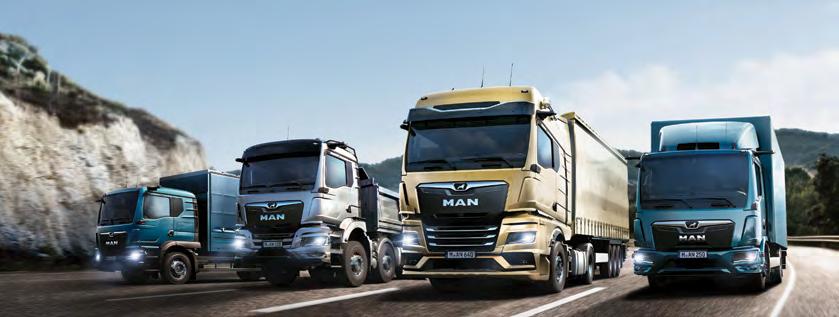












































Subject to the successful completion of the transaction, ADQ will hold a cumulative 58% stake in Aramex. This includes a 35.31% share acquired through the successful tender offer, which closed on 10 March 2025, as well as a 22.69% share owned by AD Ports Group. Aramex will be integrated into ADQ’s Transport & Logistics cluster, playing a key role in fulfilling ADQ’s mandate to build global business platforms focused on infrastructure and supply chains.
Following the successful completion, Q Logistics, a whollyowned subsidiary of ADQ made the offer, marking a significant corporate takeover.
“We are delighted to welcome Aramex to ADQ’s portfolio, following the successful voluntary tender offer and subject to successful completion of the transaction, “said Mansour AlMulla, Deputy Group Chief Executive Officer at ADQ.
He continued, “Aramex will play a pivotal role within our Transport & Logistics cluster, which already includes industry leaders like AD Ports Group, Abu Dhabi Airports, Etihad Airways, and Etihad Rail. As the majority shareholder, we are committed to leveraging our proven expertise in transforming local companies into globally competitive market leaders, ensuring long-term growth and success for Aramex and all its stakeholders.”
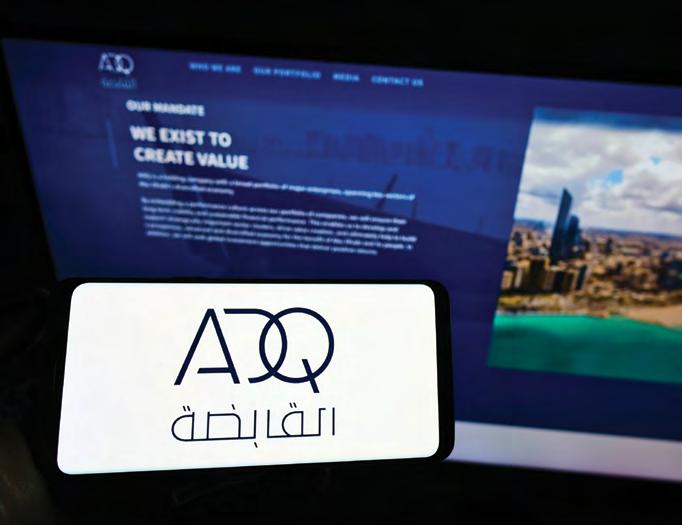
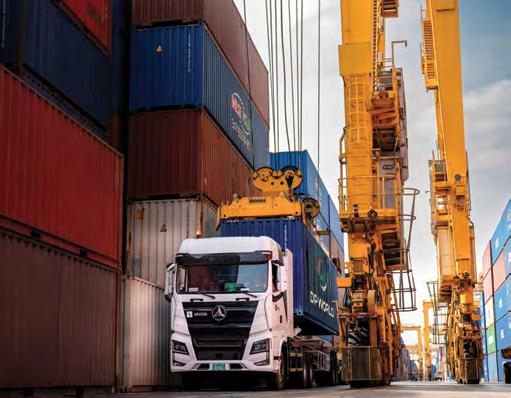
DP World has launched a cutting-edge electric freight solution at Jebel Ali Port in partnership with Einride, marking a major step towards decarbonising terminal operations. Now running around-the-clock, the first wave of the electric fleet is set to move over 204,000 twenty-foot containers annually, supporting DP World’s efforts to accelerate the transition to greener logistics.
The project is part of a groundbreaking partnership between DP World and Einride signed in May 2024 to electrify inter-terminal container flows at Jebel Ali Port, the largest seaport in the Middle East. It aligns with DP World’s broader sustainability agenda which includes electrifying its fleet of internal terminal vehicles (ITVs) and
implementing innovative partnerships to reduce emissions.
The initiative will reduce 14,600 tonnes of carbon dioxide equivalent (CO2e) annually, compared to diesel operations, supporting DP World’s science-based targets (SBTi) and ambition to make global trade smarter and greener.
Abdulla Bin Damithan, CEO and Managing Director, DP World GCC, said: “Decarbonising logistics is a core priority for DP World. We are actively electrifying our operations, integrating AI-powered solutions and working closely with our partners like Einride to support our net zero goals. As the 10th busiest port globally, Jebel Ali is setting the benchmark for the electrification of transport in high-volume trade hubs.”
Robert Falck, CEO and Founder at Einride, said:
“This marks the first of many milestones as we set out to have the largest deployment of electric, autonomous freight mobility in the Middle East. The UAE is uniquely positioned to lead this sustainable transition given its forward-thinking approach to innovation, and we are proud to drive this in partnership with DP World.”
The electric fleet is being deployed as part of a multi-phased rollout, which integrates Einride’s full platform, including electric vehicles, charging infrastructure, and the AI-driven Einride Saga operating system. A second wave will follow later this year, and the full fleet in 2026 – capable of moving 2 million twenty-foot containers annually. This tiered deployment uses Einride’s data-driven analysis to optimise cost and operational efficiency while laying the groundwork for future autonomous deployment.
With this announcement, these vehicles are now actively transporting goods within Jebel Ali Port, using Einride’s technology to make container handling more sustainable.
The UAE’s Net Zero by 2050 commitment highlights the growing role of clean mobility in national and regional sustainability agendas. DP World’s leadership in deploying electric freight solutions positions Jebel Ali Port at the forefront of this transition, setting a precedent for regional and global trade hubs.
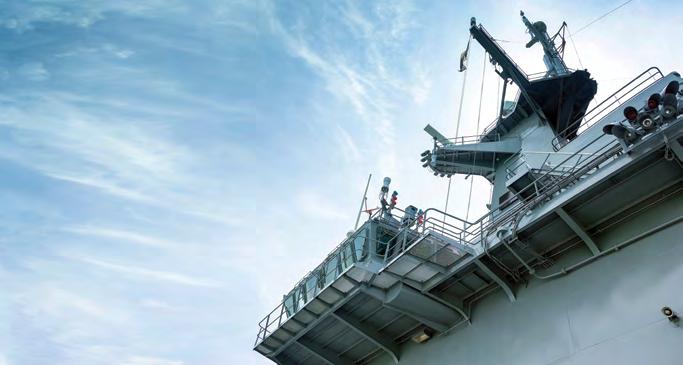
Al Seer Marine (ADX: ASM), a frontrunner in the maritime industry and a subsidiary of International Holding Company (ADX: IHC) and Damen International, an Abu Dhabi company, part of the Damen family which is known from the renowned global shipbuilding company Damen Shipyards Group, announce that their Joint Venture has secured a significant AED 1.3 billion contract with Tawazun Council to manufacture advanced Offshore Patrol Vessels (OPVs). This four-year project will bolster the UAE’s naval capabilities and enhance maritime security.
The OPVs will be equipped with cutting-edge naval technology and designed with advanced features. These vessels will be capable of conducting a wide range of missions, such as EEZ Patrol, EEZ Surveillance, EEZ Interdiction (piracy, smuggling, environmental protection), maritime law enforcements and coast guard functions, search and rescue (SAR), disaster relief.
Guy Neivens, CEO of Al Seer Marine, commented: “Tawazun’s confidence in the JV capabilities marks a significant milestone, showcasing the strength of our
shipbuilding expertise combined with comprehensive fleet support. With our proven track record in manufacturing advanced, globally competitive solutions locally in the UAE, we are committed to enhancing the UAE’s industrial base, ensuring that all the vessels we build uphold the highest levels of operational readiness for national security.”
To ensure peak performance of the fleet, the contract includes a comprehensive Integrated Logistics Support (ILS) package. This comprehensive framework ensures predictive maintenance planning, bespoke training analysis, and proactive inventory and obsolescence management. The ILS is designed to enable the vessels to remain mission-ready with minimal downtime, enhancing seamless functionality.
This significant partnership between Al Seer Marine, Damen International, and Tawazun Council marks a milestone in the UAE’s maritime defence industry. By delivering advanced naval vessels and comprehensive support services, the joint venture will contribute to the UAE’s ongoing efforts to strengthen its maritime security and protect its national interests.
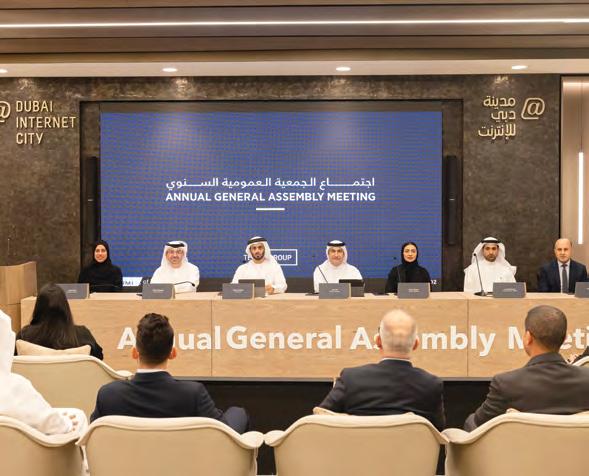
TECOM Group PJSC (DFM: TECOM), (the “Company” or the “Group”), the creator of specialised business districts and vibrant communities, held its Annual General Assembly Meeting at Dubai Internet City.
At the meeting shareholders re-elected its Board of Directors, and approved the financial statements for the year that ended 31 December 2024 as well as the recommendation by the Board of Directors to distribute a cash dividend of AED 400 million (8 fils per share) for the second half of 2024, bringing total cash dividends for the year 2024 to AED 800 million (16 fils per share), in line with the approved dividend policy in place until the end of the first half of 2025.
Malek Al Malek, Chairman of TECOM Group, said: “TECOM Group’s strong performance through 2024 has allowed us to
implement our strategic investments. This includes AED 2.7 billion of investments to deliver sustainable growth as we continue to expand and contribute to Dubai’s economic success whilst providing increased returns for our shareholders.
“We appreciate the continued trust of our investors in TECOM Group, and their recognition of our perfectly placed position to contribute to and
benefit from Dubai’s knowledge economy and hub for global investors and talent.”
TECOM Group announced its FY 2024 results on 6 February 2025, including a 11% year-on-year (YoY) increase in revenues to AED 2.4 billion with occupancy and retention rates of 94% and 92%, respectively. Full year net profits grew by 14% YoY to AED 1.2 billion with funds from operations (FFO) of AED 1.6 billion, led by improved collections and income-generating assets’ performance.
The Group has further strengthened its core business proposition through targeted portfolio expansion with a focus on quality solutions and delivering customer satisfaction across its 10 specialised strategically located business districts.
The GCC’s growing demand for seamless solutions is transforming the catering industry, pushing businesses to adopt digital tools for improved efficiency and customer experience
Technological innovation continues to transform industries, with companies embracing digital solutions to enhance operations. The demand for contactless transactions, real-time communication, and seamless customer experiences has made digital transformation essential. The catering industry is no exception, as businesses adopt online ordering platforms, inventory management systems, and CRM tools. However, fully digital catering systems remain uncommon, with many still relying on manual processes.
The shift towards digital is driven by customer expectations. As consumers become accustomed to instant access, they expect businesses to provide streamlined, efficient, and user-friendly solutions. Digital tools allow catering businesses to not only meet these expectations but also improve internal operations, enhance customer service, and reduce unnecessary costs.
Traditional quotation methods are slow, requiring multiple rounds of communication. Repetitive tasks like quote building and inventory checks delay client decision-making and increase operational pressure. Customers also face limited visibility into menus, prices, and order statuses, leading to confusion. Manual tracking causes scheduling inefficiencies and kitchen order mismanagement, resulting in delays and errors.
The inefficiencies of manual processes also impact profitability. Businesses spend more on labor-intensive tasks, reducing margins, while
human errors in order processing and delivery scheduling cause customer dissatisfaction. In industries where efficiency is crucial, digitisation helps streamline workflows and minimise costly mistakes.
Consumer expectations in the GCC have shifted towards digital-first services, inspired by homegrown and international e-commerce platforms and delivery aggregators. However, the catering industry has been slow to adapt due to cost concerns, reliance on traditional operations, and fear of losing the personal touch. Despite this, brands like Blast Catering are leading the shift with user-friendly digital platforms, streamlining ordering, analytics, and customer interactions. As GCC clients increasingly demand digital solutions, embracing technology is essential for competitiveness.
The region’s high smartphone penetration further accelerates this demand. Consumers expect to place orders, track deliveries, and modify bookings via mobile devices. Businesses that fail to adapt risk losing clients to competitors offering a more modern, seamless experience.
AI-driven tools are reshaping catering with predictive menu recommendations, smart chatbots, and data-driven personalisation. Automated inventory systems enhance stock monitoring and forecasting, reducing waste and optimising purchases. Companies like Foodie Holdings have leveraged ERP customisation to ensure more precise planning and execution.
AI also improves the customer experience by learning preferences and offering tailored recommendations. For example, analytics can suggest dishes based on previous orders and seasonal trends, helping businesses upsell effectively. Smart chatbots provide instant responses to customer inquiries, resolving issues quickly while reducing the burden on customer service teams.
Technology also enables eco-friendly practices, such as energy-efficient kitchen equipment and optimised delivery routes, aligning with sustainability goals. Digital tracking of resource usage strengthens efforts to combat climate change while enhancing operational efficiency. Companies can use analytics to measure their carbon footprint, reduce food waste, and comply with environmental regulations.
Integration with third-party logistics providers is another advantage of digitisation. Automated scheduling and tracking ensure timely, accurate deliveries. Cloud-based solutions allow businesses to oversee multiple locations, standardise processes, and maintain quality control across different outlets.
Digital transformation is most effective when it integrates seamlessly into operations rather than functioning in silos. Educating clients on self-service platforms drives adoption, while balancing automation with human interaction maintains strong customer relationships. The true measure of success lies in increased retention, repeat business, and scalable operations.
Collaboration between technology providers and catering businesses is vital for developing industryspecific solutions. Generic software may not address unique catering needs, but working with developers ensures tools are tailored to challenges. Partnerships with logistics, event planning, and payment solution providers further enhance service offerings.
By embracing digital innovation, GCC businesses can enhance efficiency, improve customer experiences, and future-proof operations in an increasingly tech-driven market. The transition may require an initial investment, but the long-term benefits—improved efficiency, reduced costs, and a competitive edge—make digital transformation a necessity.
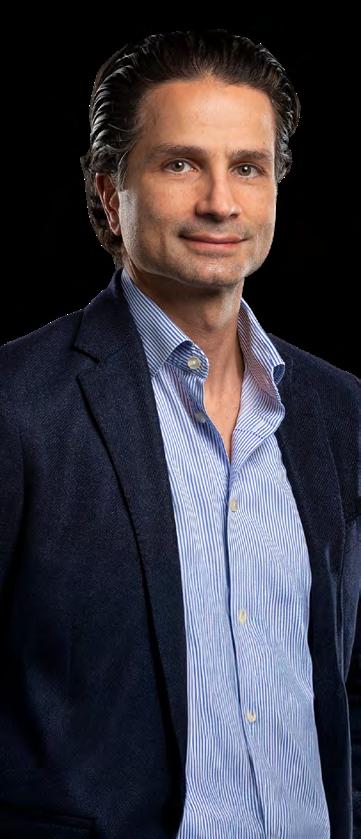
Kareem Abughazaleh, Founder & CEO of Foodie Holdings
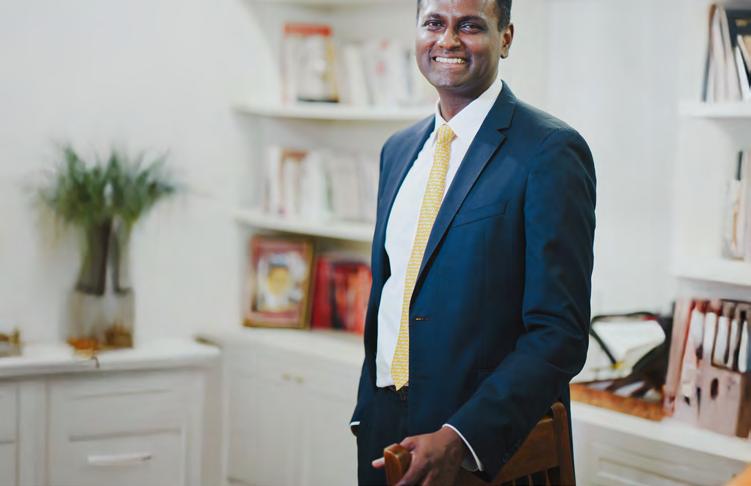

From a supply chain and procurement perspective, how secure are our food sources in the UAE?

The Arabian Peninsula has been long associated with arid climatic conditions and limited water resources. Despite these fundamental challenges, both the UAE and KSA rank among the top 50 nations in the Economist Impact Global Food Security Index – a credible feat indeed. This performance stems from proactive government efforts focused on boosting self-sufficiency, investing in food-tech, and securing diversified global supply chains.
While food security is high, most of the GCC countries have long grappled with a structural vulnerability
– import reliance. The UAE for example imports over 85% of its food. This reliance on global sources exposes the nation to risks including price volatility, climate disruptions, and geopolitical uncertainty. Recent global events have only magnified these threats, underscoring the urgency of building resilience through strategic procurement, technological innovation, and global partnerships. In a survey run by TransformationX and GPCA in H2 2024, leading supply chain leaders in the GCC ranked global war and trade route disruption as the risks they were most worried about.
GCC governments have begun massive localisation programmes across industries, including in agriculture. UAE’s National Food Security Strategy targets 50% local agricultural production by 2051. Saudi Arabia aims to localise 85% of its food processing by the end of the decade. Innovations such as hydroponics, vertical farming, AI-enabled precision agriculture are all powering this aggressive localisation. Food Tech Valley in the UAE exemplifies this push, acting as a hub for climate-smart farming solutions. While these advances are promising, domestic production alone cannot meet national demand.
For GCC countries, international procurement remains indispensable to food security. To navigate increasing global volatility and ensure uninterrupted access to food sources, GCC countries must proactively build supply chain resilience across five core levers: supply chain visibility, operational flexibility, risk processes, international collaboration, and organisational capability.
Supply chain visibility is foundational enabled by predictive analytics and digitised control towers that allow real-time monitoring of critical variables such as rainfall in sourcing regions, shifts in freight
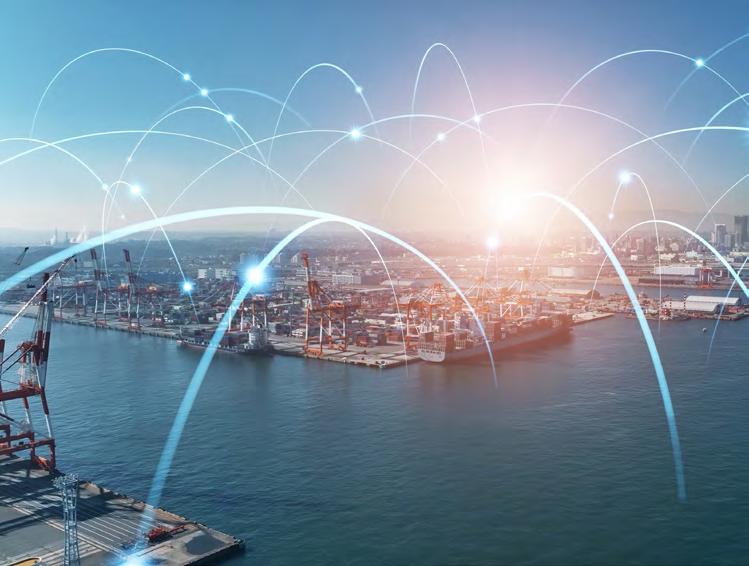
rates, or early signs of geopolitical disruption. Such advanced visibility at country and corporate levels can ensure agile sourcing to keep prices low and availability high.
This visibility feeds directly into flexibility, where tools like supplier diversification, distributed production networks, and diversified logistics infrastructure help absorb shocks and adapt to disruptions. Current flexibility strategies could be made more agile by investing further in localised
production clusters, establishing alternative warehousing and logistics hubs across the region, and maintaining standby supplier agreements that can be quickly activated in crisis scenarios.
Risk processes such as agile inventory norms, structured business continuity plans, and dedicated risk governance bodies provide the backbone for consistent and rapid response. Trade agreements such as the UAE–India Food Corridor serve as structural buffers, but the evolving nature of global
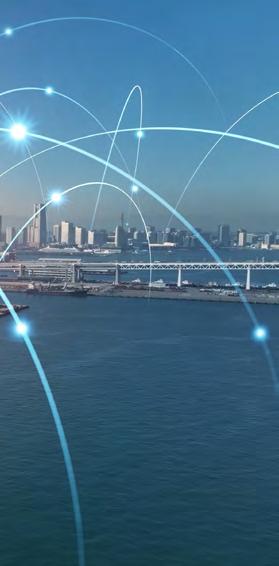
risks demands these processes to be stress-tested more frequently, integrated across supply tiers, and aligned with dynamic scenario planning models.
Meanwhile, collaboration, particularly through strong supplier relationships and global partnerships remains essential. The UAE–US climatesmart farming initiative, recently
expanded to USD 29.2 billion, reflecting a commitment to co-developing sustainable solutions. Deeper collaboration is needed across all supply tiers, especially with smaller producers in vulnerable regions, to build mutual resilience. Strengthening supplier relationship management frameworks, expanding regional knowledgesharing platforms, and ensuring contingency planning is built into contracts are areas still ripe for development.
Finally, organisational and people capability provide the cultural and structural foundation for resilience. From leadership support to risk management training and risk capability building, regional organisations
can do a lot to ensure resilience becomes systemic. While there has been growing awareness, many organisations, especially smaller players within the ecosystem, still lack structured programmes to build these capabilities.
Together, these interconnected levers form a comprehensive strategy - shifting the region to higher levels of resilience. As the UAE redefines its approach to food security, building resilient, tech-driven, and globally integrated supply chains is no longer optional—it’s missioncritical. In navigating this new normal, supply chain and procurement strategies will play a decisive role in securing the country’s food future.
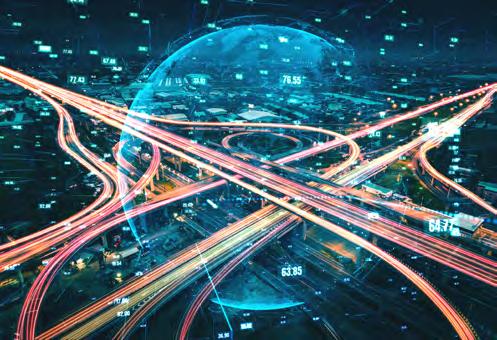
Trevor Stamp, General
Manager
for Contract Logistics, GAC Dubai, discusses how the Middle East can adopt lessons from Europe’s logistics sector to enhance efficiency, technology use, and competitiveness
The global logistics landscape is evolving at a dizzying pace. According to a Global Market Insights report, the value of the worldwide contract logistics market is expected to exceed USD 597 billion by 2034, primarily due to changing consumer habits sparking a rise in demand for e-commerce goods and services. And with it comes a surge in demand for warehousing, value-added services and last-mile delivery services that are equal to the complex task.
Countries in the Middle East are strategically located at the crossroads of transit corridors linking Asia, Europe – and to make the most of that advantage whilst diversifying their economies, they are investing heavily in infrastructure to boost their capacity and capabilities to handle increasing levels of cargo.
The development of new port infrastructure, free trade zones and related road and rail projects in the region will increase throughput and benefit players in the online retail market. But the full benefits can only be realised through
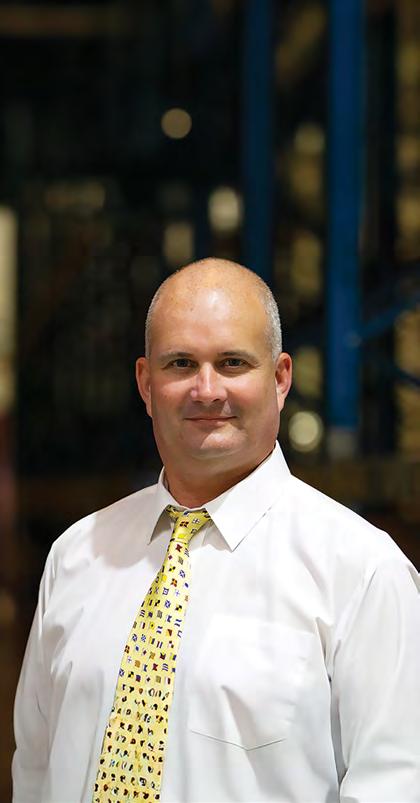
the rapid advance and smart implementation of technology to optimise logistics operations.
Developments in the use of automation, the Internet of Things (devices with sensors, processing ability and software connecting and exchanging data with other devices and systems), Blockchain and Artificial Intelligence (AI) are already reshaping logistics. Such innovations are driving efficiencies in energy management,
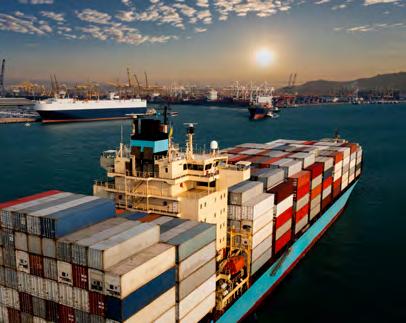
insurance, repairs and port charges – benefiting businesses and consumers alike by streamlining trade and enhancing digital convenience.
“The coming months will be crucial,” says Trevor Stamp, General Manager – Contract Logistics at GAC Dubai. “This year will see more operational technology applied to logistics processes than ever as companies strive to enhance capacity and remain competitive. So, it’s no surprise that it promises to be a period of continuous improvement to systems and work processes in the Middle East as the region evolves its growing logistics sector.”
GAC aims to stay ahead by adopting advanced systems and processes. The application of the Manhattan SCALE system using AI to part of its extensive contract logistics activities in Dubai is already making day-to-day operations more efficient.
“It represents the next step in the evolution of our warehouses to ensure we continue to support retail and other businesses as they evolve with the changing logistics landscape,” adds Stamp.
Lessons to Be Learned
Players in the Middle East must keep abreast of developments in other regions. Europe, in particular, is driving the development of more standardised logistics operations, with a greater focus on audits, ISOs, and health and safety.
By driving this culture into logistics operations, businesses are forging a way to stay competitive and keep costs down. And as Europe ramps up its operations to focus on standardisation, Middle East players learn from their experiences and implement similar standards into their own cultures.
Stamp notes: “When I first joined GAC Dubai from a similar role in Europe just before the pandemic, the use of Six Sigma processes to minimise risks and boost quality and efficiency was probably not as widespread in the Middle East as it is today. Now, it is a part of GAC’s global offering as customers look to ensure that we are lean, cost conscious and aware of all the risks in a fastmoving environment.”
Businesses want to know that the logistics partners they work with have the processes and tools to manage potential risks. And in Europe, applying such risk mitigation techniques has already brought big changes in making workflows leaner and costs lower.
GAC has successfully implemented risk mitigation strategies and warehouse optimisation solutions for several European clients, resulting in significant improvements in efficiency, productivity, and cost savings. In one case, they implemented a tailored warehouse management system and re-designed the warehouse layout for a leading pharmaceutical company, helping the
customer reduce storage costs by 25%, increase picking accuracy by 30% and improve delivery times by 40%.
More disruption is coming to the global contract logistics market with disintermediation –cutting out intermediaries – as suppliers start going directly to their customers and cutting out distributors from the process. Companies that once relied on complex distribution networks are now pivoting toward direct fulfilment models, optimising their warehousing and last-mile delivery capabilities.
“At GAC Dubai, we see this as an opportunity, not a threat,” says Stamp. “It is a chance for us to access all manner of direct B2B and B2C delivery network options in the Middle East – as well as some home deliveries in Dubai –to offer our expertise and experience to help them develop the right processes for them and their customers.
We understand the impact of disintermediation on our customers’ businesses, and we offer them a range of solutions and services to help them navigate the change and maintain their competitive edge.”
GAC’s tailored services,
such as direct-to-consumer solutions and e-commerce implementation strategies, enable the businesses its supports to communicate directly with their end-customers and access advanced management and logistics capabilities, while also reaping the benefits of the supply chain optimisation, data analytics insights and flexible solutions the Group offers.
By leveraging GAC’s expertise and solutions, customers can navigate the challenges of disintermediation and thrive in a rapidly changing business environment.
Warehousing is changing. Digital investments in logistics operations have surged,and e-commerce giants and manufacturers alike are rethinking
their supply chain strategies and forming partnerships with thirdparty logistics firms that can provide end-to-end fulfilment.
“Bringing these improvements to our customers is at the forefront of everything we do at GAC,” adds Stamp. “It does not matter who they are or what cargo they need moving, we are always seeking to learn lessons and seek out the best way to use technology to offer our customers cost savings and work efficiencies as they access the Middle East’s growing market.
“We have seen what works in Europe. Now it is time for the Middle East to learn from lessons elsewhere to secure its place as a global powerhouse in contract logistics and e-commerce,” Stamp concludes.
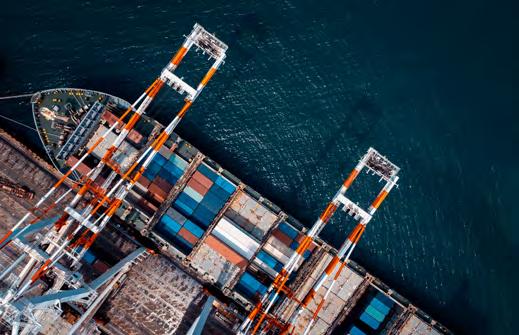
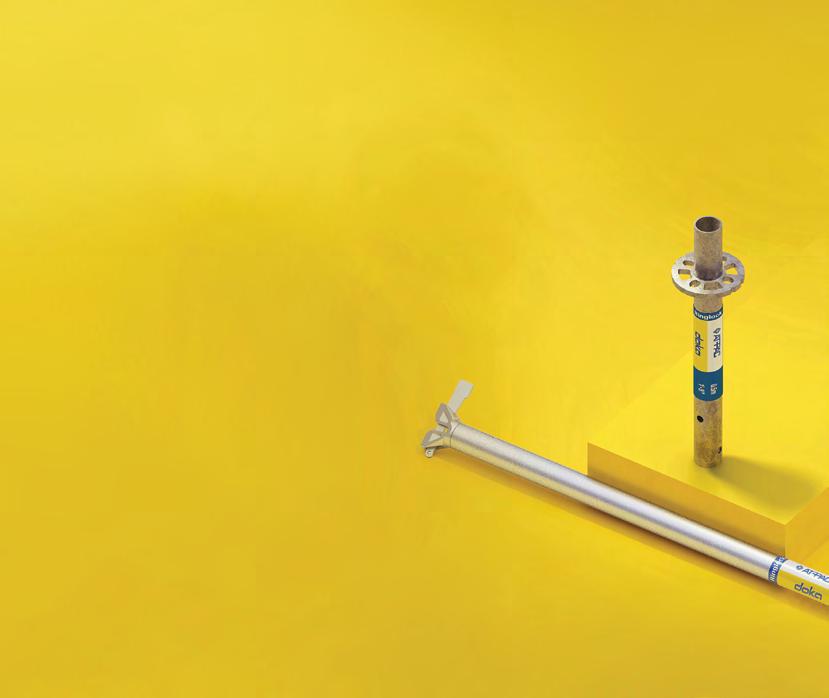

Require formwork and scaffolding? Check out Doka’s extensive list of products and systems, which now includes scaffolding for a variety of applications. At Doka, our philosophy is to provide a broad range of services under one umbrella based on a growing demand for single-source solutions that adhere to the highest standards.
/DokaMEA /company/doka-middle-east-africa /doka_mea
meaapmarketing@doka.com | www.doka-me.com
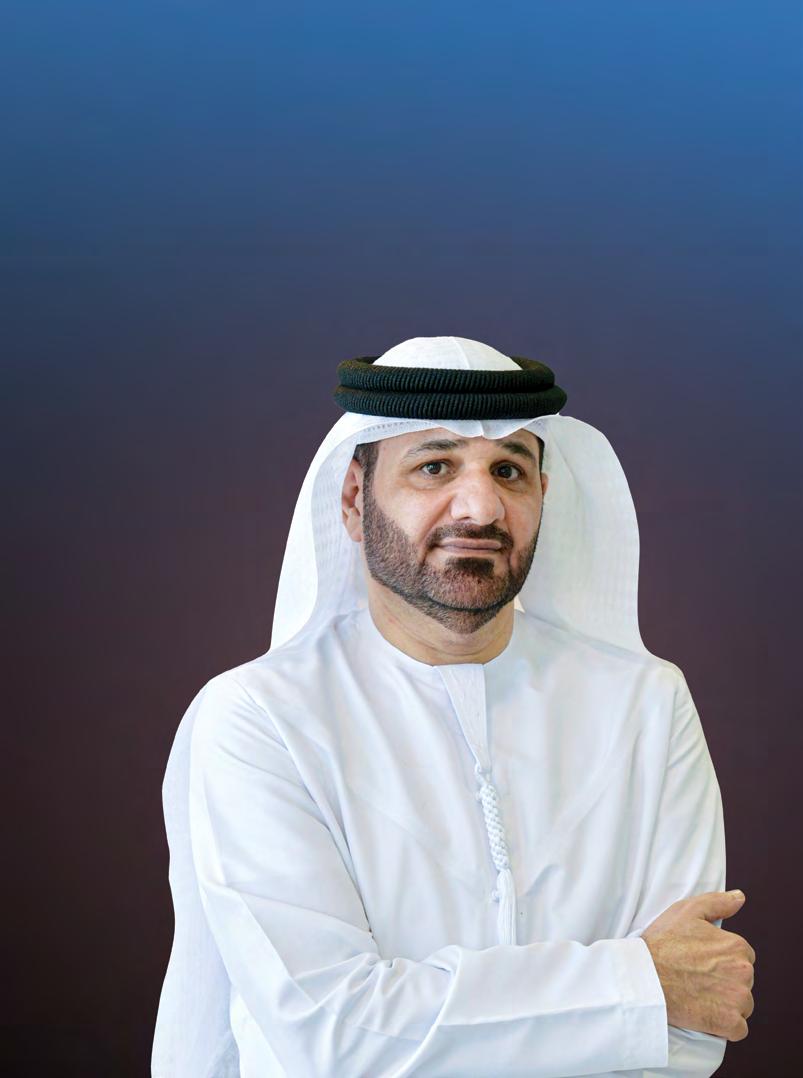
Mahmood Amin Khoury, Advisor at Dubai Maritime Authority, part of the Ports, Customs and Free Zone Corporation, shares insights on the growth and ongoing importance of wooden dhows in Dubai’s trade
The Marine Agency for Wooden Dhows, a division of the Ports, Customs, and Free Zone Corporation in Dubai, reported that the import and export volume for wooden ship voyages at Al Hamriya Port reached 1.4 million tons, reflecting a robust 16% increase.
This growth was primarily driven by a surge in food and beverage trade, particularly with key trading partners, highlighting the strength of trade relations and the crucial role of Al Hamriya Port in facilitating these exchanges. Mahmood shares further details:
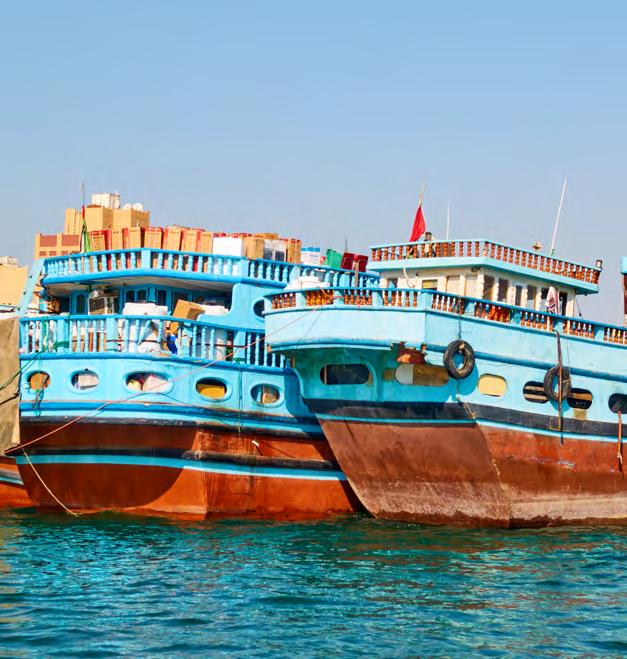
Tell us more about the growth of the wooden ship trade in 2025.
The wooden ship trade at Mina Hamriya in 2024 and 2025 demonstrates substantial growth across various sectors. In the first quarter of 2025, foodstuff and vegetable volumes increased by 11%, reaching 138,015 tons, up from 124,664 tons in 2024. General cargo saw a 24% rise, growing from 25,225 tons in 2024 to 31,257 tons in 2025. The RoRo (Roll-on/ Roll-off) category experienced an exceptional 25,250% spike, rising from a mere 2 tons in 2024 to 507 tons in 2025. Livestock trade also saw a significant 55% increase, reaching 331,520 tons in 2025 compared to 213,462 tons in 2024. These figures reflect a strong upward trajectory in the wooden ship trade, with particularly impressive growth in sectors like RoRo and livestock.
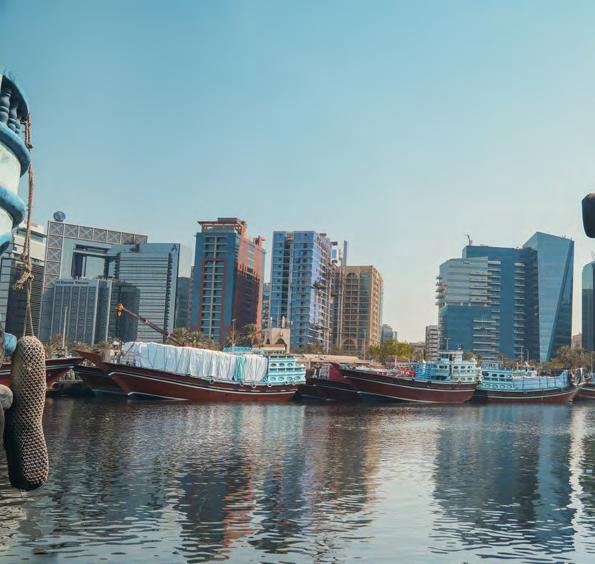
Wooden dhows have been a significant part of Dubai’s economy. Can you elaborate on their role in regional trade today?
Absolutely. The Marine Agency for Wooden Dhows have historically been a backbone of Dubai’s trade, transporting goods such as spices, textiles, and livestock along ancient maritime routes. Today, they remain vital for trade with neighboring countries, carrying a wide range of goods, including electronics,
machinery, vehicles, and construction materials. Dubai continues to be the hub for dhow activity, and we are seeing consistent growth in this sector. In recent years, we have expanded our operations to new lines and destinations, indicating a healthy and organic rise in this trade. This continued reliance on wooden dhows underscores their integral role in sustaining Dubai’s economy.
Additionally, these vessels provide a cost-effective solution for transporting goods to regions where larger, modern cargo ships may not have easy access. Their ability to navigate smaller ports and waterways
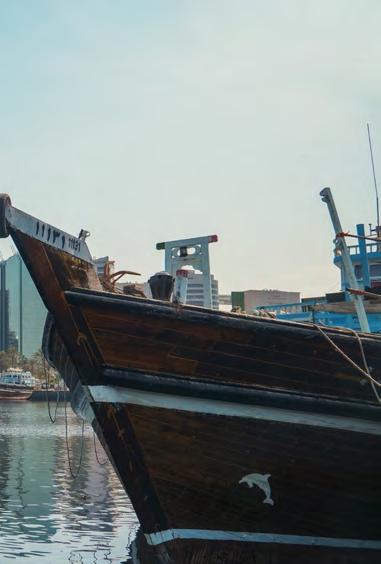
allows businesses to maintain direct trade links with partners across the Gulf, East Africa, and the Indian subcontinent. Unlike large-scale commercial shipping, dhow trade maintains a personal and direct trading relationship, which is a key factor in its longevity and resilience in a rapidly modernising global economy.
Have there been any significant technological advancements in the marine agency’s operations to support this industry?
Yes, we have made remarkable progress in
streamlining operations through technology. Our integrated system now consolidates all payment processing and administrative tasks into a single, unified platform. This innovation has greatly enhanced efficiency, reduced manual processes, and ensured seamless management of our operations. By digitising key functions, we’ve improved service delivery, benefiting both our clients and the broader dhow trade network.
Further, we are working on implementing real-time tracking and automation solutions that will allow better monitoring of shipments and increased transparency in transactions. This will not only help businesses manage their logistics more effectively but also improve security and compliance with international trade regulations. The introduction of digital payment solutions has also made transactions faster and more reliable, reducing reliance on traditional cash-based trading systems.
What does the future look like for Dubai’s ports and the wooden ship trade?
Dubai’s ports are on the brink of a transformative phase, with a strong emphasis on technological advancements and sustainability to remain competitive on the global stage. The government and private sector stakeholders are investing in eco-friendly initiatives, improved port infrastructure, and automation to handle increasing trade volumes more efficiently.
While the wooden ship trade may not fully integrate into the technological revolution as other sectors do, it will continue to thrive by preserving traditional craftsmanship and targeting niche markets. Many small and medium-sized enterprises (SMEs) depend on dhow trade for cost-efficient transport, and this reliance ensures a steady demand for these vessels. The balance between heritage and modernity will be key in maintaining relevance in an increasingly digitised world. Looking ahead, we are confident that this industry will continue to be an essential part of Dubai’s maritime economy.
Given the rapid modernisation of global trade, how will wooden dhows remain relevant in the coming years?
Wooden dhows have a unique place in maritime trade, offering flexibility, cost-effectiveness, and access to markets that larger vessels cannot reach. Their adaptability ensures their continued relevance. Additionally, the industry is evolving, with improvements in operational efficiencies, safety measures, and destination expansion. As long as there is a demand for cost-effective, regional transport solutions, wooden dhows will continue to serve an essential role in Dubai’s trade landscape.
Another advantage of dhows is their ability to operate in an informal trading environment, catering to markets that may not be served by conventional shipping lines. The cost of maintenance and operation is also significantly lower than modern cargo ships, making them an attractive option for traders looking for efficient yet affordable means of transportation. We expect that in the coming years, some level of modernisation will be incorporated into dhow operations, such as hybrid engine technologies or improved logistics management systems, ensuring they stay competitive while maintaining their traditional essence.
How is sustainability being incorporated, given the global push for greener shipping solutions?
Sustainability is an increasingly important topic in global trade, and we are looking into ways to make dhow operations more ecofriendly. While these traditional vessels are already relatively
sustainable due to their smaller carbon footprint compared to large container ships, there is room for improvement.
One of our focus areas is
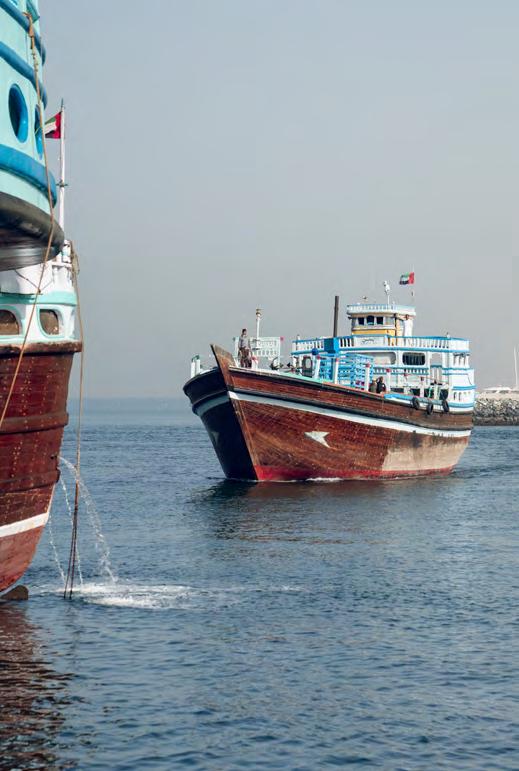
encouraging the use of sustainable materials in dhow construction and maintenance. Some dhow builders are now exploring ways to reduce the environmental impact by using responsibly sourced wood and eco-friendly coatings. Additionally, there are discussions about integrating solar-powered systems for auxiliary energy needs, such as lighting and navigation equipment, reducing reliance on dieselpowered generators.
Dubai’s broader sustainability initiatives, such as reducing emissions in the maritime sector and promoting cleaner fuel alternatives, may also influence dhow operations. As the global shipping industry shifts towards greener solutions, it is essential for the dhow trade to explore methods that align with these environmental objectives without compromising the traditional nature of these vessels.
Are there any challenges that the sector is currently facing?
Like any industry, the wooden dhow trade has its set of challenges. One major issue is regulatory compliance, as international shipping regulations continue to evolve to ensure security and environmental sustainability. While dhows operate on a smaller scale compared to large cargo ships, they still need to comply with customs regulations, safety standards, and port entry requirements. Adapting to these regulations while maintaining the affordability
and simplicity of dhow operations can be a challenge. Another concern is the competition from modern shipping methods, which offer faster delivery times and larger capacities. However, the unique advantages of dhow trade, such as lower costs and the ability to reach smaller ports, continue to give them an edge in niche markets.
Additionally, the industry faces generational challenges, as fewer young people are entering the trade. Preserving the traditional skills of dhow building and navigation is crucial for the longterm sustainability of this sector. Programmes that promote heritage preservation and skills training are necessary to ensure that this vital aspect of Dubai’s trade history continues to thrive.
What is your future outlook for Dubai’s ports and the wooden ship trade?
The industry is in a strong position for sustained growth. The expansion into new routes, the integration of technological support in operations, and the unwavering demand for cost-effective regional trade solutions all contribute to a positive outlook. While modernisation is inevitable, preserving the traditional significance of wooden dhows will ensure they remain a cornerstone of Dubai’s thriving maritime economy for years to come.
With ongoing investments in infrastructure, sustainability, and efficiency improvements, we anticipate continued prosperity in the dhow trade. As long as there is a demand for flexible, affordable, and reliable shipping solutions, dhows will continue to play a crucial role in Dubai’s position as a leading maritime hub.

Nitin Tatiwala, Vice President, Marketing, Customer Experience, and Air Network at FedEx Middle East, Indian Subcontinent and Africa highlights the power of last-mile delivery in elevating e-commerce shopping experiences
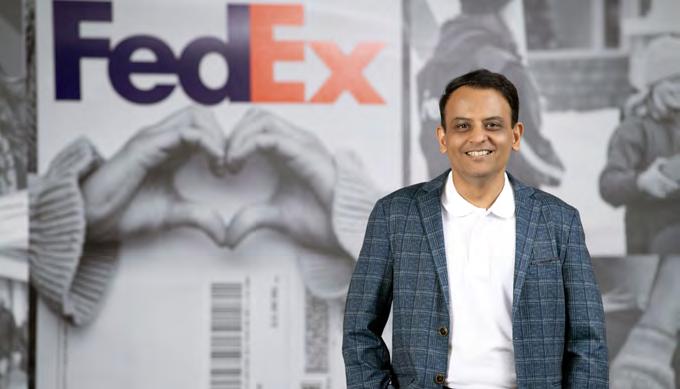
The moment of truth in e-commerce is not when a consumer clicks ‘buy’, it is when the package arrives at their doorstep. That final stretch, known as last-mile delivery, is where customer loyalty is often won or lost.
In the Gulf Cooperation Council (GCC), the digital commerce market is on a steep growth trajectory, driven by a young, tech-savvy population and rising smartphone adoption. As consumers increasingly turn to online shopping for its convenience and variety, the region’s e-commerce market is expected to grow from USD

39 billion in 2023 to USD 50 billion by the end of 2025. This rapid growth highlights the region’s increasing reliance on online retail, making efficient last-mile logistics more critical than ever.
For many e-tailers, managing logistics and shipping procedures may seem complex and timeconsuming, diverting focus from their core operations. In addition to expertise and peace of mind, an established logistics provider that
offers smart, seamless, and efficient delivery services gives a competitive edge to e-commerce businesses and a better experience for their consumers.
Shoppers today expect more than just fast shipping. They want transparency, easy returns, and the power to control when and where their orders arrive. Meeting these expectations requires innovative and
tech-driven logistics solutions that not only ensure timely deliveries but also enhance trust and convenience. Technology is rapidly transforming last-mile logistics into a customer-first experience. With near real-time tracking, smart notifications, and Picture Proof of Delivery, package recipients can track their shipments, adjust delivery times or locations, and receive visual confirmation that their package has been successfully delivered. WhatsApp notifications are one such innovative channel used by logistics providers to give consumers detailed updates on the journey of a package from dispatch to doorstep. These solutions help consumers stay informed and in control of their deliveries, enhancing confidence, and the overall experience.
As e-commerce continues to grow, sustainability is becoming an essential consideration for
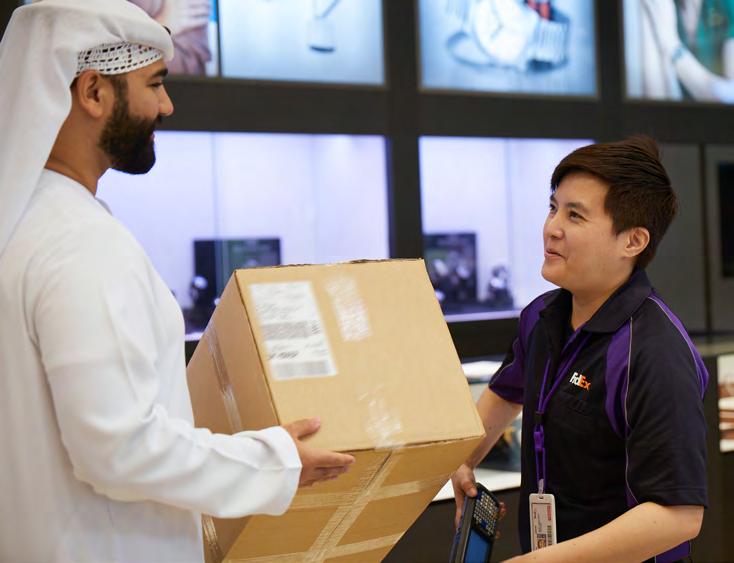
businesses and consumers alike. Shoppers today are more conscious of their environmental impact and prefer brands that align with their values. In response, logistics providers are investing in sustainable technologies such as electric vehicles (EV) as part of parcel pickup and delivery fleets, reduced-waste packaging, and energy-efficient facilities to help reduce the sector’s carbon footprint. Smart logistics providers can also provide e-commerce businesses with digital sustainability tools to provide
estimates of their shipments’ carbon emissions, so they can improve transparency in their sustainability reporting.
According to the World Economic Forum, optimising urban lastmile delivery systems through EV deployment and effective databased connectivity solutions has the potential to reduce CO2 emissions by 30%, congestion by 30%, and delivery costs by 25% by 2030 . These advancements not only contribute to
environmental impact reduction but can also drive operational efficiency and cost-effectiveness. Demonstrating how what is good for the planet can also be good for business.
Last-mile delivery is no longer just about logistics, it is a defining part of the consumer experience. As technology continues to evolve, businesses that prioritise speed, flexibility, and sustainability will set themselves apart in the e-commerce race.

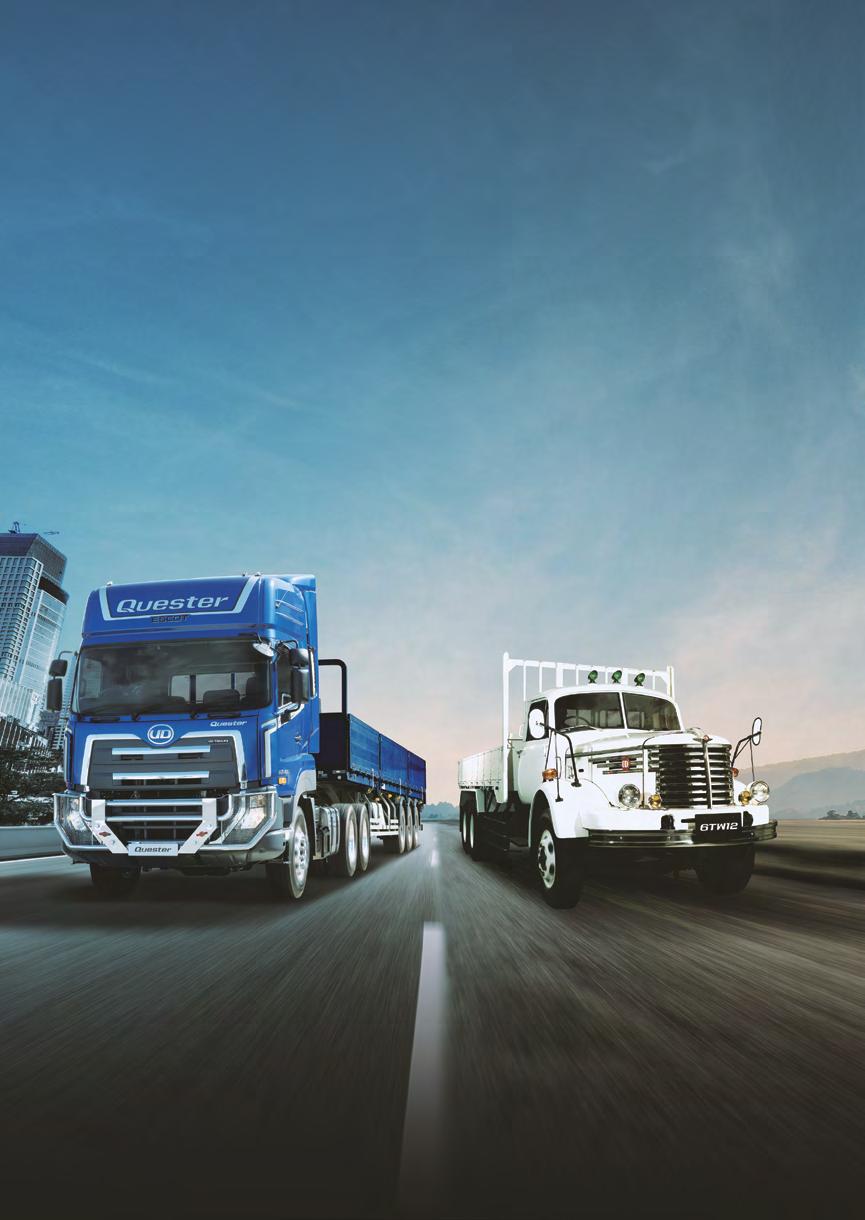

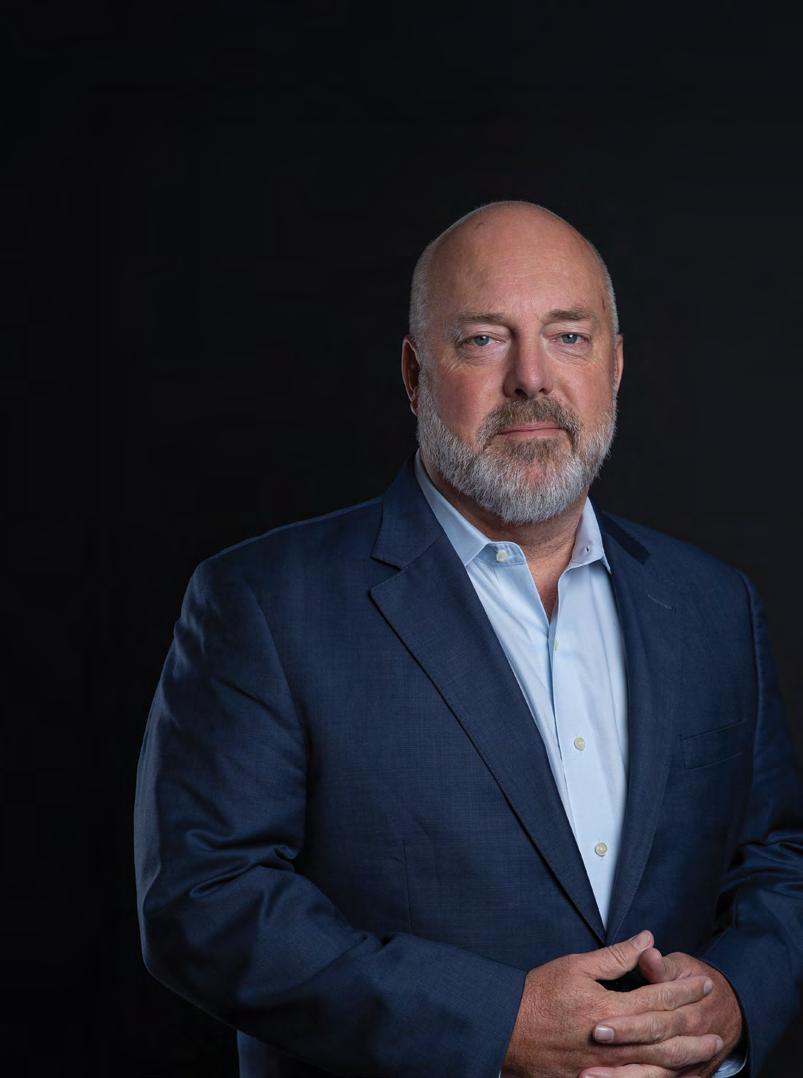
Justin Endres, Chief Revenue Officer, Seclore, highlights how the company is shaping data security in the logistics world

How important is it for companies to protect their data particularly in the logistics sector? What risks are there if they fail to do that?
Data is the lifeblood of the logistics sector— powering everything from supply chain blueprints and shipping manifests to commercial contracts and customer records. As logistics becomes more digitised, interconnected, and reliant on thirdparty ecosystems, the importance of protecting this data has never been greater.
A breach in logistics data can result in far more than just operational downtime. It can lead to intellectual property theft, manipulation of shipment routes, compromised trade secrets, and even national security implications— especially in regions where logistics supports critical infrastructure or defense. The financial repercussions alone can be staggering, including penalties for non-compliance with international data protection regulations, contract losses, and reputational damage that can take years to recover from.
With sensitive information routinely exchanged between customs authorities, freight carriers, warehouse providers, and
government entities, the attack surface is vast. And unlike other industries, logistics firms often rely on real-time data flow to operate efficiently. That means any disruption— whether from a cyberattack or accidental data leak— can create ripple effects that paralyse supply chains.
At Seclore, we believe that data protection must extend beyond the enterprise perimeter. It’s not enough to secure networks and devices. True resilience comes from securing the data itself, ensuring that even if it’s shared, it remains controlled, visible, and protected. In the logistics sector, where speed and precision are paramount, this kind of persistent, data-centric security isn’t a luxury—it’s a necessity for operational continuity and trust across global supply chains.
What are some of the biggest challenges when it comes to data security in logistics, and how does Seclore address these challenges with its products?
One major challenge is maintaining control over sensitive data once it leaves the organisation— whether it’s shared with contractors, customs officials, or third-party logistics providers. Traditional perimeter-
based security solutions don’t solve this.
Seclore addresses this by embedding security directly into the data. Our data-centric approach ensures that the file itself carries usage controls, encryption, and tracking— regardless of where it travels or who accesses it. This is crucial for logistics firms managing data through dynamic and distributed ecosystems.
How does Seclore’s technology differ from traditional cybersecurity solutions, especially when it comes to securing sensitive logistics data? Most cybersecurity tools focus on keeping attackers out. But in logistics, data often must go out—to ports, partners, vendors and international regulators. Seclore goes beyond traditional network and device-level security by securing the data itself. Our platform enables persistent, granular control over sensitive files— even after they’ve been downloaded and shared outside of the organisation.
What are some common misconceptions companies in the logistics industry may have when it comes to data security?
A big one is that encryption alone is enough. Encryption helps during the data storage and
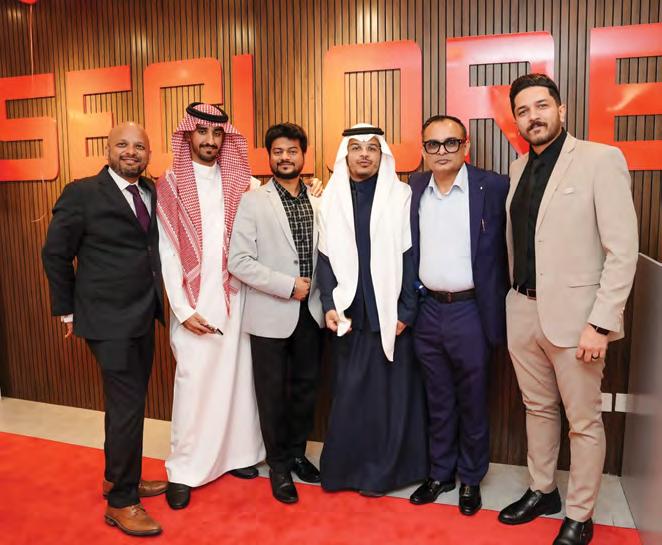
transit, but once data is accessed and shared, it’s often left unprotected.
Another common misconception is that security will slow operations. With Seclore, protection is automated and integrates seamlessly with existing workflows—so security becomes a silent enabler, not a roadblock.
Last month, you opened your
Saudi Headquarters in Riyadh, what is your aim behind this move?
Our decision to open a KSA HQ in Riyadh aligns with Saudi Arabia’s Vision 2030 and best supports our customers in the region. We’re here to be a trusted partner to enterprises and government entities in the Kingdom, delivering advanced data security capabilities that empower innovation while keeping sensitive data safe.
What influence will this step have in the Kingdom?
We established our HQ in Saudi for several reasons; it allows us to build local partnerships, invest in regional talent, and offer on-the-ground support to our customers and other organisations prioritising data protection. It also reflects our commitment to supporting national initiatives like Vision 2030, where together we’re advancing KSA and doing so
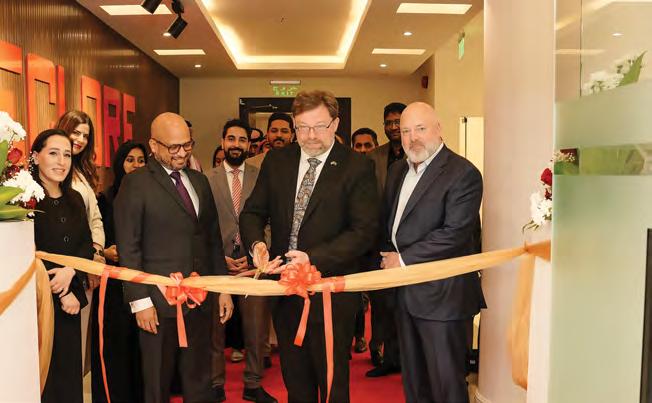
while creating a more secure digital ecosystem across public and private sectors.
Tell us about your Secure 2030 initiative. Secure 2030 is Seclore’s commitment to supporting the cybersecurity pillars of Vision 2030. Through this initiative, we’re focused on empowering organisations with data-centric security strategies, local enablement, and compliance support.
We’re working closely with government bodies and strategic industries—including oil & gas, finance, and logistics—to ensure that as the Kingdom transforms digitally, data remains secure every step of the way.
Does Seclore have plans to expand further in the Middle East, and what are some strategies you are focusing on to increase your footprint in the region?
Absolutely. The Middle East is a key growth market for us. Beyond Saudi Arabia, we’re exploring expansion across the entire region.
Our focus is on local partnerships, regional compliance support, and building an ecosystem of trust—enabling governments and enterprises to protect their most valuable asset: data.
“As the digital transformation accelerates across the region, organisations must rethink how they protect data in a borderless, cloud-enabled world. Organisations in logistics are especially connected and often need to share data across a complex supply chain, adding exponential risk from third parties. At Seclore, we’re proud to lead the charge with technology that puts control back in the hands of data owners, no matter where the data may travel.”
- Justin Endres, Chief Revenue Officer, Seclore
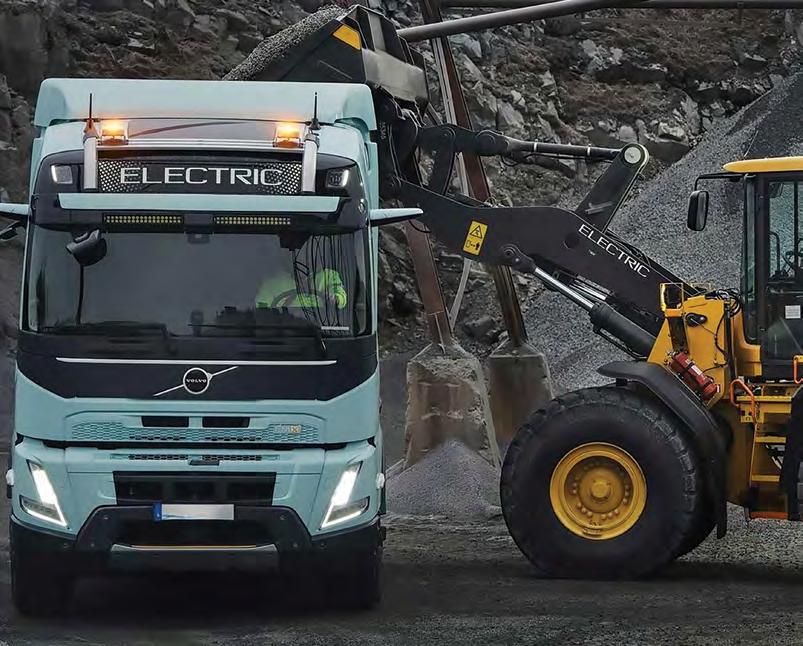
Volvo CE electrifies Bauma 2025 with first-ever zero-emission-only lineup
Volvo CE is set to make history at Bauma 2025 (April 7-13) with the unveiling of its first-ever zero-emission-only lineup. This groundbreaking showcase will feature an exclusive all-electric range and marks a significant milestone in Volvo CE’s commitment to sustainable innovation.
The platform will also include a worldwide first launch of a new Volvo zero-emission machine, designed for key industrial segments in the construction industry. Volvo CE also provides conventional diesel options of all zero-emission models on show that deliver industry-leading fuel efficiency improvements of up to 15%, offering customers the choice of technology that meets their
needs wherever they are on their transformation journey. An interactive Solutions Bar will provide the ideal environment for customers to focus on tailored, data-driven advice and business solutions to unlock new levels of productivity, efficiency, and sustainability.
Visitors to Bauma 2025 will have the unique opportunity to experience
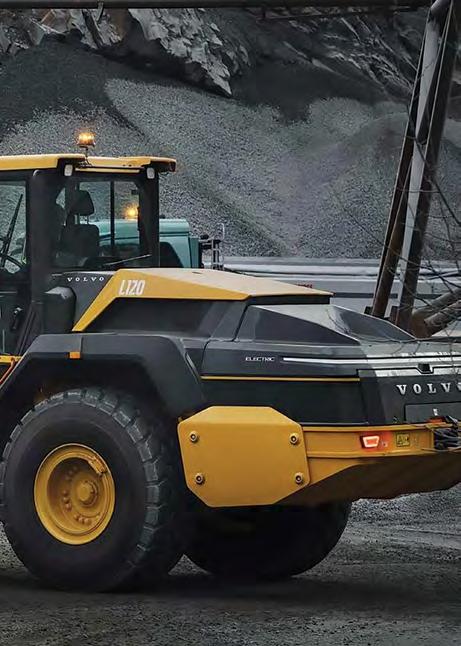
Volvo CE’s all-electric lineup, which exemplifies the company’s dedication to reducing environmental impact while maintaining superior customer performance. This exclusive range, including recently launched models of excavators and loaders, is designed to meet the diverse needs of the construction industry, offering cutting-edge technology and efficiency. The show will also see the worldwide, never-before-seen launch of a brand-new Volvo zero-emission machine designed for use in key industrial segments in the construction industry.
In addition to its zero-emission lineup, Volvo CE will also illustrate that conventional diesel options are available to customers for all zero-emission models on display. These models are engineered to deliver industry-leading fuel efficiency, with improvements of up to 15%, and exceptional productivity. This multi-technology approach ensures that Volvo CE continues to provide versatile solutions that
cater to a wide array of customer requirements, wherever they are in their transformation journey. The showcase at Bauma 2025 represents Volvo CE’s most extensive product portfolio overhaul in decades. With over 35% of its range renewed in the past 12 months, Volvo CE is setting the stage for the future of construction equipment.
Melker Jernberg, President of Volvo CE, said:
“We are at a critical moment in our industry’s transformation. With our biggest launch ever, featuring a range of versatile technologies, we are prepared to offer industry-leading products, services, and solutions to assist customers at any stage of their transformation journey. We stand firm in our commitments to innovation, sustainability and leadership in the industry.”
At the heart of this experience will be a new interactive Solutions Bar, demonstrating Volvo CE’s commitment to being a total solutions provider. It will focus on tailored, data-driven advice and business solutions for customers to unlock new levels of productivity, efficiency, and sustainability. Whether it’s reducing carbon emissions, maximising capacity, boosting profitability, or achieving all these goals simultaneously, Volvo’s experts are there to deliver practical, actionable solutions, through a combination of advanced machines, integrated services, and flexible financial offering.
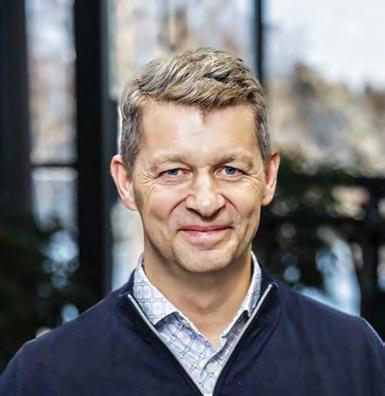
Melker Jernberg, President of Volvo CE
Philippi-Hagenbuch announces zero-emission steel option, aiding customers with their environmental goals
Philippi-Hagenbuch Inc., a global leader in off-highway truck customisation, is broadening its steel options by introducing the zero-emission SSAB ZeroTM steel for its haul truck equipment. This eco-friendly steel is now available for all of Philippi-Hagenbuch’s custom products, including HiVol® truck bodies, Rear Eject bodies, HiVol® Water Tanks, and their entire range of off-highway trailers. The introduction of zero-emission steel aids fleet managers and producers in achieving their sustainability objectives while benefiting from high-efficiency equipment tailored to their operations.
“Philippi-Hagenbuch has a history of being at the forefront of the industry when it comes to the materials we use and the designs of our products,” said Josh Swank, chief growth officer at Philippi-Hagenbuch. “Zero-emission steel is part of that ongoing mantra we’ve had over the last 55 years. This provides customers high-quality, fully customised equipment with the same toughness they’ve come to expect with our products, but in a package that also helps minimise their environmental impact.”
The SSAB Zero steel is made from recycled materials, supporting the circular economy, which emphasises
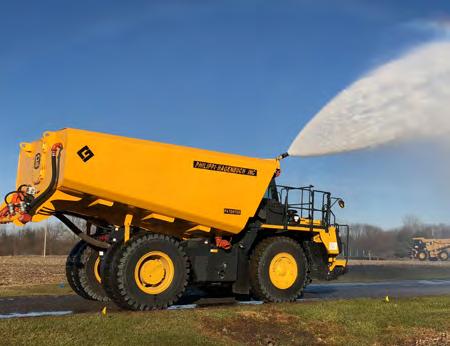
reusing products for as long as possible. This zero-emission steel is especially beneficial for full body replacements, including HiVol Bodies, HiVol Water Tanks, and Rear Eject Bodies. Philippi-Hagenbuch’s zeroemission solutions offer the same durability and abrasion resistance as traditional SSAB steel, without sacrificing performance. While opting for zero-emission steel may increase costs, it offers potential benefits such as carbon credits and eligibility for projects with stricter sustainability requirements. Philippi-Hagenbuch provides detailed calculations for both options to help customers make informed decisions about their steel selection.
Beyond its existing environmental contributions, zero-
emission steel adds another layer of sustainability. Each PhilippiHagenbuch product is customdesigned to help customers maximise their haul truck capabilities, promoting more sustainable practices. For instance, water tanks reduce dust and environmental particulates while optimising spray efficiency, minimising fuel consumption and the need for backtracking. Additionally, truck bodies, tailgates, and sideboards enhance material hauling capacity, leading to fewer trips and ultimately lower fuel usage per ton transported.

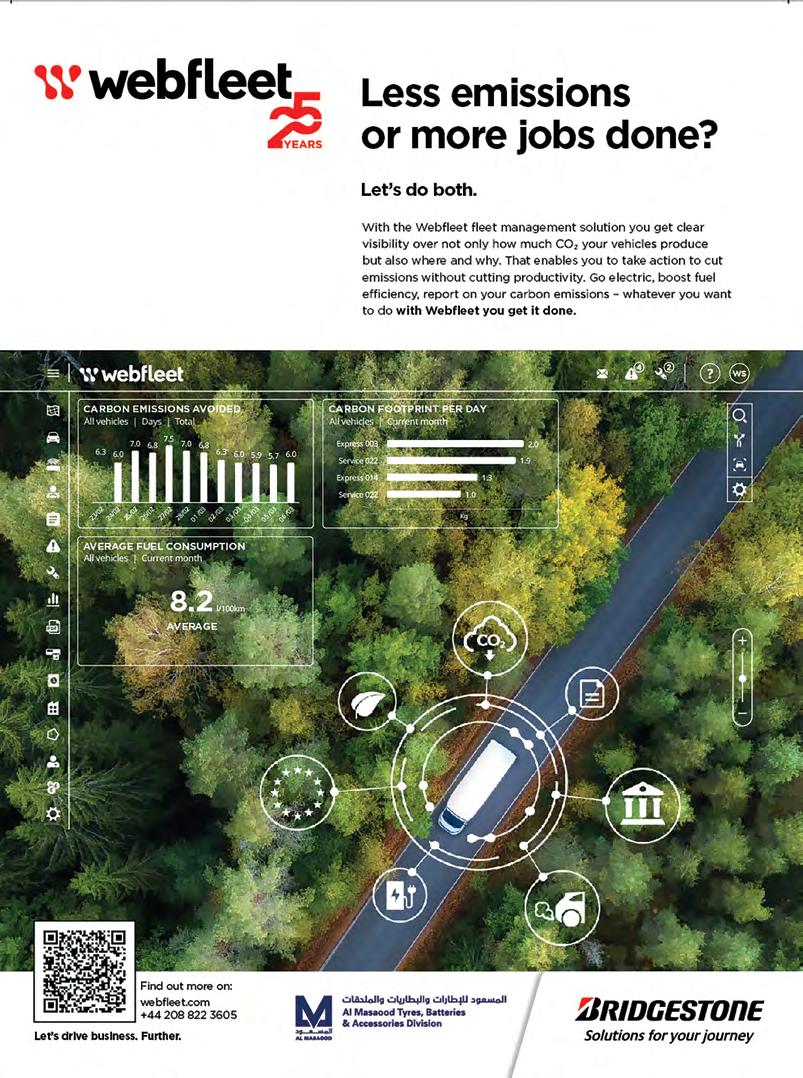
Bryn Heimbeck, Co-Founder and President of Trade Tech, Inc., discusses the UAE’s Maritime Preload Cargo Information (MPCI) Programme and how Trade Tech’s expertise can help companies navigate the upcoming compliance requirements by the July 2025 deadline
The UAE’s Maritime Preload Cargo Information (MPCI) programme, managed by the UAE’s National Advance Information Center (NAIC) under the Federal Authority of Identity, Citizenship, Customs, and Ports Security (ICP), requires electronic submission of containerised cargo details at least 24 hours prior to vessel departure from last foreign departure port outside the UAE.
Can you explain how the UAE’s MPCI Program aligns with the broader global trend toward standardised pre-departure security filings? How do you see this evolving in the next few years?
The UAE’s MPCI Programme is part of the ongoing global effort to enhance maritime supply chain safety and risk management. It reflects a broader international trend where global trade is recognised as a critical part of every nations’ economy and needs to be safeguarded against potential threats while continuing its viability.
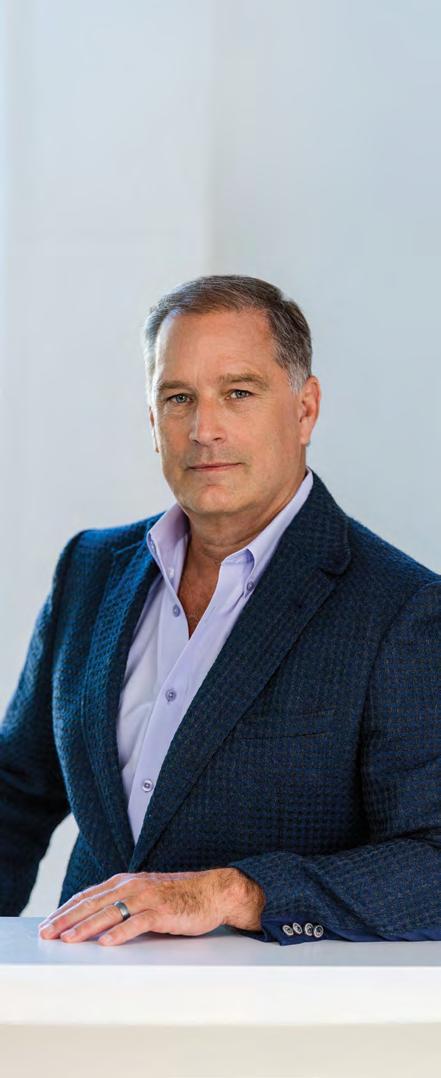
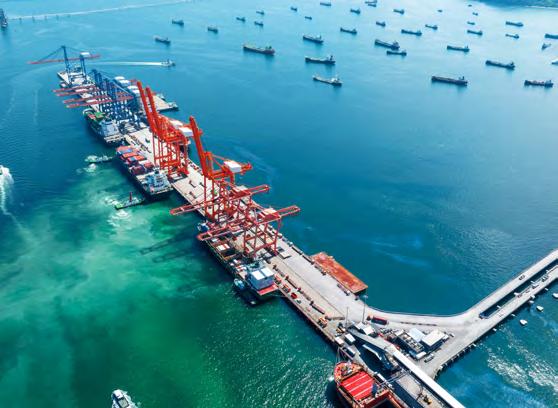
Since 2002, nearly 40 countries have implemented advanced cargo information systems to improve risk assessment and trade flow. The UAE is the next country, and it is not likely to be the last. The UAE was one of the leading countries to implement pre-loading cargo information for air shipments (PLACI), setting an early example for proactive, risk-based controls. Expanding this to maritime cargo through the MPCI programme strengthens that approach and supports more secure, streamlined trade.
The programme follows similar approaches already established in regions like North America and Europe, demonstrating a consistent global approach to pre-departure cargo information reporting. By requiring electronic submission of containerised cargo details 24 hours prior to vessel departure, the UAE is aligning with international best practices in trade security.
As global trade evolves, pre-departure filing systems will continue to be refined, with each region adapting enhancements implemented by others and a growing trend toward standardisation in their local and global security requirements.
Trade Tech has experience with regulatory requirements like the EU’s ICS2 and the US ISF. How has this experience
prepared you for the challenges of the MPCI Program?
Trade Tech’s work with 36 Customs Agencies in North America, Europe, Japan, and South Africa has given it both the technical depth and regulatory experience to address MPCI requirements quickly and thoroughly. These past implementations have given us the experience on how to manage multiple parties, ensure early-stage data readiness, and maintain compliance across jurisdictions, while supporting the company’s growing customer base.
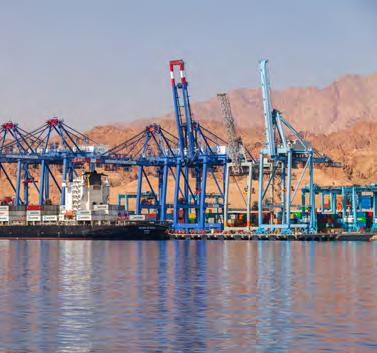
What do you believe are the key challenges companies might face when implementing the MPCI Program, and how can Trade Tech help them navigate these hurdles? Advanced Manifest Submission requirements are incredibly similar; it’s the reporting of the Bill of Lading information. The challenge is guiding users through the process of multiple transmissions to each of the Customs Agencies enroute to the final destination. Working in stand-alone system solutions creates complexity at many levels. Our platform focuses on managing a single shipment from origin to destination. It captures, structures, and transmits the Advanced Manifest Submissions to each Customs Agency enroute, and at destination, as required in today’s new world of information flow.
The key opportunity and challenge for destination forwarding agencies is to deploy this growing standard to improve their operational processes and digital offerings to their customer base. These regulations require capturing and standardising the shipment data at origin from before the cargo loads on board the vessel and create a potential solution for visibility that has been in demand throughout the market for years.
Experience has shown that educating the global market early is crucial, not just focusing on the local market where the regulatory requirement is being implemented. It’s the origins that need to be prepared for the new requirements at the destination. This requires a concerted effort worldwide, in local languages, with local assistance.
What steps is Trade Tech taking to ensure that the transition for companies is as smooth as possible, particularly with such a tight deadline (July 2025)?
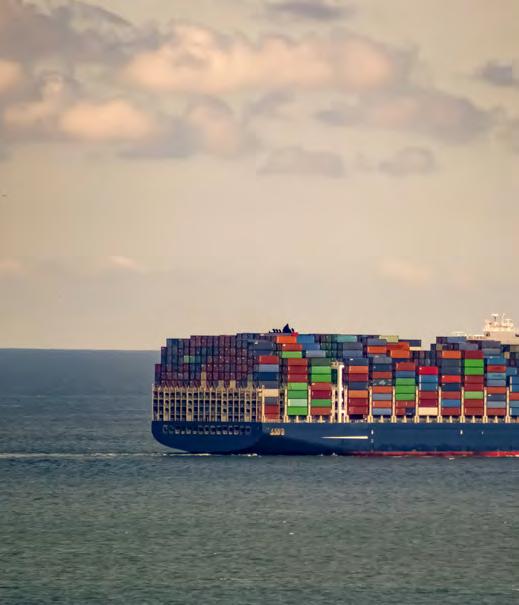
We have taken early action to prepare both its technology and its customers for the MPCI deadline. The company’s development teams are building specific MPCI functionality within its Syrinx Trade Security platform, aligned with NAIC requirements. At the same time, Trade Tech is working directly with customers to:
• Support NAIC registration and technical onboarding
• Provide hands-on training for operations and compliance teams
• Offer early integration and test filing environments
• Deliver tailored outreach based on a company’s filing role and complexity
The goal is to reduce uncertainty and give clients the tools and confidence to be fully compliant well before July
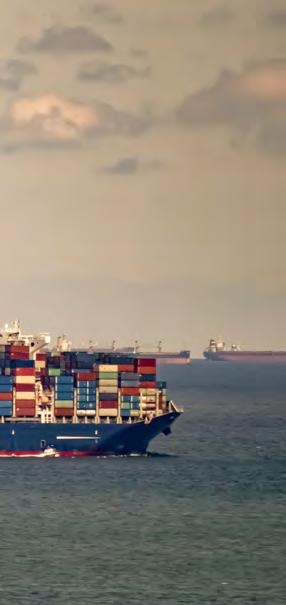
25. Our experience in supporting ICS2 ENS rollout and similar systems in the US, Japan, Mexico, and Canada, amongst others, means it has detailed knowledge of what is needed.
What do you think will be the immediate and long-term impact of this regulation on global supply chains, particularly in the Middle East region?
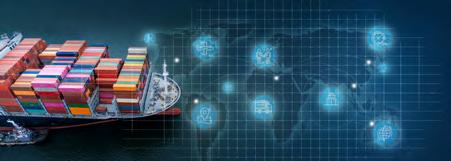
In the near term, companies will need to adjust their internal workflows to ensure data is ready earlier in the shipment lifecycle. This may require process changes or closer integration between partners.
Over the long term, the benefits are substantial. The regulation will:
• Reduce the risk of last-minute shipping disruptions
• Enhance supply chain visibility and coordination
• Strengthen the UAE’s role as a secure, efficient logistics hub
The model is also expected to influence broader regulatory alignment across GCC countries and beyond, especially in regions looking to modernise their maritime controls.
Trade Tech currently operates in over 35 countries. How do you ensure that your platform is flexible enough to handle different regulatory requirements across jurisdictions?
Flexibility is at the core of our platform design. Syrinx Trade Security allows users to handle multiple filing types from a single interface — including ICS2, ISF, AMS, and now MPCI — without needing to reconfigure their internal systems.
Key features include:
• Multiple input options: direct entry, structured uploads, or full EDI integration
• Support for both carrier and house-level filings
• Real-time filing status dashboards
for visibility across jurisdictions
• Secure data exchange with Customs and supply chain partners
Because we operate globally — with offices across North America, Asia, Europe, and the Middle East — we’re able to localise support while maintaining a globally consistent platform experience.
What advice would you give to companies who are just starting to prepare for compliance with the UAE’s MPCI Programme? Start now. With the implementation deadline fast approaching, early preparation is essential. Begin by understanding the filing roles and responsibilities that apply to your organisation, whether you’re a vessel operator, master loader, or forwarder.
Make sure your systems can:
• Capture the required data well in advance of departure
• Format and submit it electronically through the approved filing channels
• Respond quickly to NAIC feedback or requests for information
Equally important is choosing the right technology partner — one with a proven track record in pre-departure security filings. A reliable platform can reduce manual effort, help prevent errors, and ensure your cargo isn’t delayed due to incomplete or late filings.
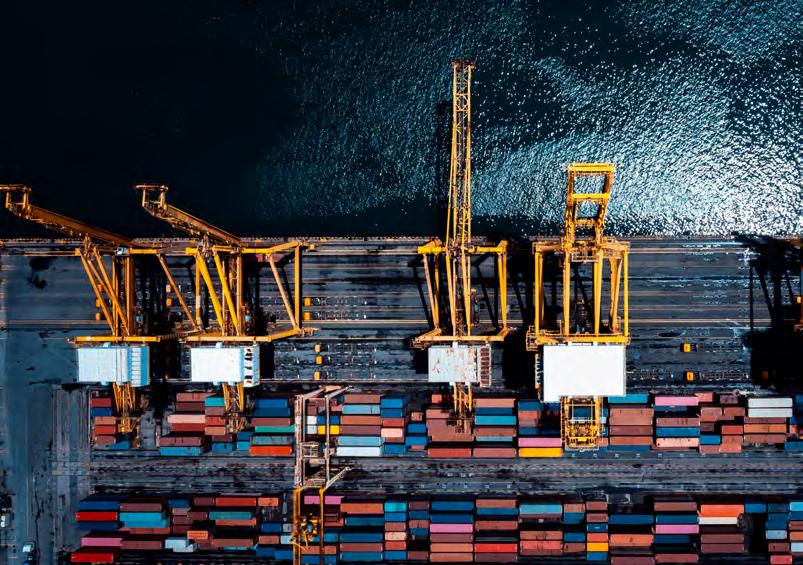

IAs U.S. tariff policies ripple across global markets, the Middle East’s logistics sector is at the crossroads of disruption and reinvention. With rising trade tensions and shifting economic alliances, regional players must navigate uncharted waters with agility, innovation, and strategic foresight.
Words by: Vibha Mehta
n an era where global trade is as volatile as the shifting sands of the desert, the Middle East’s logistics industry is facing an unexpected twist: U.S. tariff sanctions that were once distant tremors are now echoing across the ports of Jebel Ali, the runways of King Khalid International Airport, and the warehouses dotting Dammam and Doha. As the United States adjusts its trade policies—imposing new tariffs or reinstating old ones—a domino effect is underway. And
the Middle East, strategically positioned at the nexus of Asia, Europe, and Africa, is feeling the tremors beneath its supply chain foundations.
Historically, the region has thrived on its ability to serve as a transshipment hub. Dubai’s status as a logistics powerhouse is well-earned, with its state-of-the-art free zones and seamless customs processes. Yet, when U.S. tariffs affect
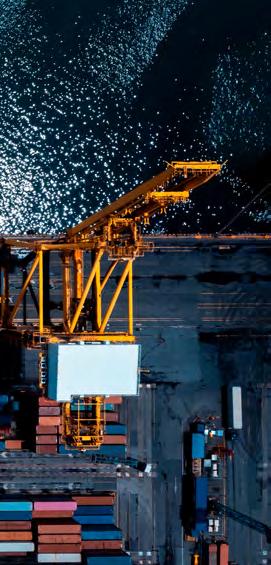
goods coming from Asia or Europe— the region’s top trading partners—the ripple is felt in delayed shipments, price adjustments, and shifts in inventory flows. For example, if tariffs make Chinese goods more expensive in the U.S., Middle Eastern re-exporters must find alternative markets or absorb cost escalations that erode profit margins.
Furthermore, this tariff-induced recalibration of global trade routes has pushed logistics firms in the Middle East to reassess their risk strategies. Gone are the days of static, linear supply chains. Today, agility is the new currency. Companies are diversifying their supplier base, rerouting shipments through less-affected corridors, and investing in digitisation tools to improve supply chain visibility. Real-time tracking, predictive analytics, and blockchain-powered documentation are becoming essential tools in this new era of logistics.
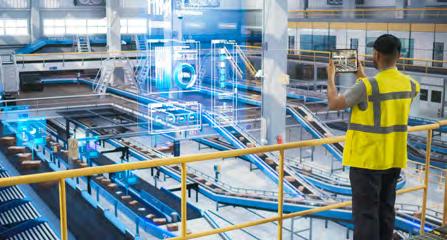
At the heart of these changes lies an opportunity—to transform challenge into capability. As Western economies realign and look inward, the Middle East has a unique chance to deepen ties with emerging markets in Asia and Africa. Countries like Saudi Arabia and the UAE are already seizing this momentum through multimodal
investments and logistics reforms. The Saudi Logistics Hub initiative and the UAE’s National Advanced Logistics Platform (NAFIS) are prime examples of how the region asserts itself as a transit point and a global logistics innovator.
Moreover, the sanctions have prompted a rethinking of warehousing strategies.
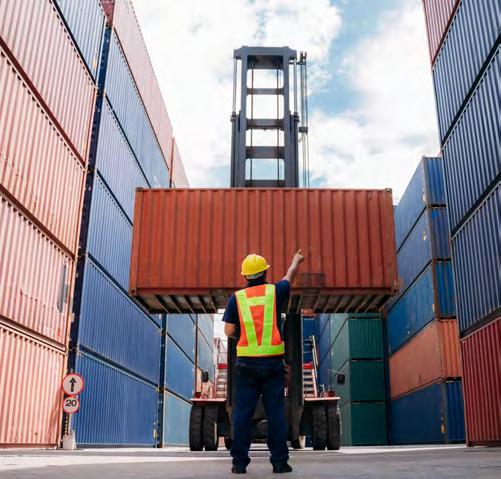
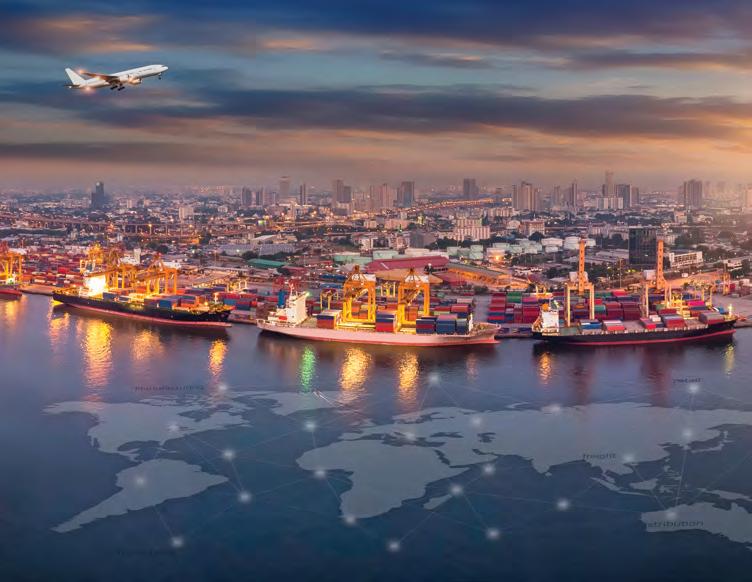
Regional logistics players are building resilient inventories with uncertainty looming over international lead times. This means increased investment in bonded warehouses, cold storage facilities, and integrated logistics centres—a boon for infrastructure developers but a challenge for those managing tight operating margins.
Then, there’s the human capital angle. As the region’s logistics footprint expands, so does the demand for skilled professionals adept at managing international compliance,
digital logistics tools, and cross-border customs protocols. Education institutions and private logistics firms are partnering to upskill the workforce, making adaptability not just a business strategy but a cultural mindset.
At the heart of this evolution is infrastructure. The Middle East is no longer content with being just a pitstop for global trade—it is positioning itself as a world-class logistics engine. Projects like Saudi Arabia’s King Salman International Complex for Maritime Industries and the UAE’s
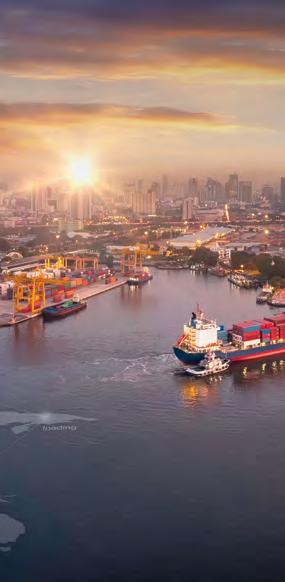
Etihad Rail network are testaments to this ambition. These are not mere upgrades but transformative undertakings that redefine how cargo and commerce move across deserts, borders, and seas.
Sustainability, too, is becoming a cornerstone of the new logistics vision. With global climate commitments
tightening, Gulf countries embed green principles into their supply chains. Hydrogen-powered transport fleets, carbon-neutral warehouses, and solar-integrated ports are no longer futuristic dreams—they’re becoming necessary. The logic is clear: a cleaner supply chain is better for the planet, operational efficiency, and international appeal.
Finally, as regional logistics players
brace for further global volatility, adaptability remains their greatest strength. The capacity to reimagine routes, localise manufacturing, embrace tech disruption, and build diplomatic bridges will keep Middle Eastern logistics not just afloat—but thriving. In the face of shifting tariffs and trade winds, the region is rewriting the rules of resilience, one container, one corridor, and one bold strategy at a time.
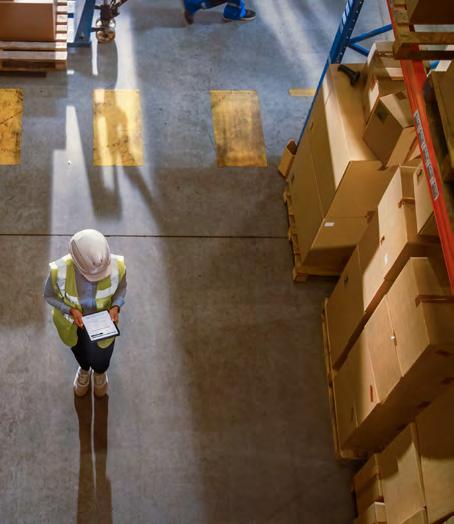

Words by: Aya Zhang
The United Arab Emirates (UAE) continues to solidify its position as a global logistics hub, driven by strategic investments, technological advancements, and a commitment to sustainability. As of 2025, several key trends are shaping the logistics landscape in the UAE:
1. Advanced Air Mobility: Integrating Air Taxis and Cargo Drones
The UAE is pioneering the integration of air taxis and cargo drones into its transportation infrastructure. In February 2025, the civil aviation authority initiated the mapping of air corridors to facilitate both piloted and autonomous aerial vehicles. This initiative aims to establish operational pathways for air taxis and drones, with commercial air taxi services expected to launch by 2026.
2. Expansion of Al Maktoum International Airport: Enhancing Air Freight Capacity
Dubai is undergoing a massive expansion of Al Maktoum International Airport, with a projected investment of around USD 35 billion. The development aims to transform the airport into the world’s largest, with the capacity to handle up to 260 million passengers annually. This expansion is set to significantly boost the UAE’s air
freight capacity, reinforcing its status as a global logistics centre.
3. Port and Maritime Infrastructure Development: Strengthening Global Trade Links
The UAE continues to invest in expanding and modernising its port facilities, such as Jebel Ali Port in Dubai and Khalifa Port in Abu Dhabi. These developments enhance the country’s role as a transshipment and
distribution hub connecting Europe, Asia, and Africa. Investments focus on increasing capacity, improving efficiency, and implementing smart port technologies to streamline operations.
4. Digital Transformation: Leveraging Technology for Logistics Optimisation
The logistics sector in the UAE is embracing digitalisation through
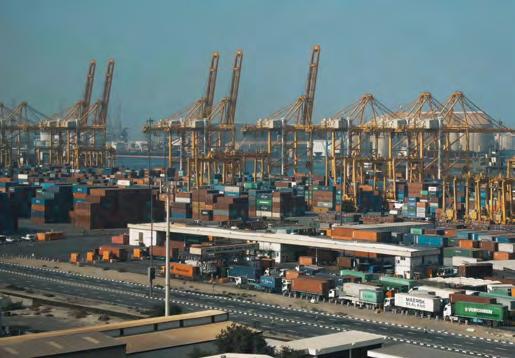
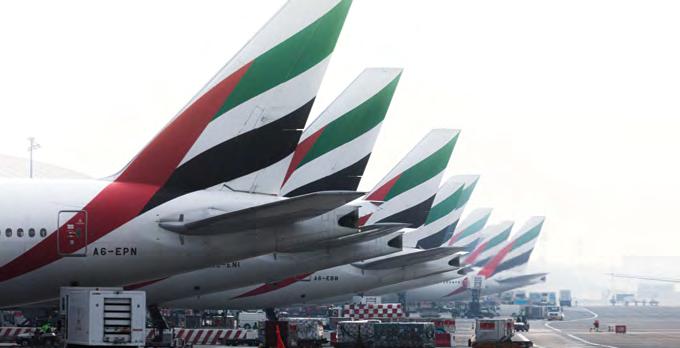
the adoption of technologies like artificial intelligence (AI), machine learning (ML), and blockchain. AI and ML are utilised for predictive analytics, route optimisation, and inventory management, while
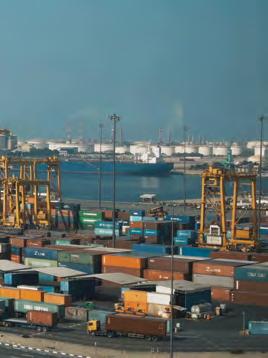
blockchain enhances transparency and security in supply chain transactions. These technologies contribute to more efficient and reliable logistics operations.
5. Sustainability Initiatives: Committing to Green Logistics Practices
Aligning with global sustainability goals, the UAE’s logistics industry is adopting eco-friendly practices. Initiatives include investing in electric and hybrid delivery vehicles, implementing green warehousing powered by renewable energy, and developing sustainable packaging solutions. These efforts aim to reduce the carbon footprint of logistics operations and promote environmental stewardship.
6. E-Commerce Growth and Last-Mile Delivery Innovations
The rapid growth of e-commerce in the UAE has heightened the demand for efficient last-mile delivery solutions. Logistics companies are investing in technologies such as smart lockers,
drone deliveries, and AI-driven demand forecasting to meet consumer expectations for fast and reliable service. These innovations address the challenges of urban delivery and enhance the overall customer experience.
7. Multimodal Transportation
The UAE is developing multimodal transportation networks to optimise logistics operations. Projects like the Etihad Rail network aim to connect key industrial areas across the UAE and integrate with the broader Gulf Cooperation Council (GCC) rail network. This development is expected to reduce reliance on road transport, lower emissions, and improve the efficiency of freight movement.
These trends underscore the UAE’s commitment to enhancing its logistics sector through technological innovation, infrastructure development, and sustainable practices, reinforcing its position as a pivotal player in global trade and transportation.
Director of Digital Strategy and Growth, Transcorp International
With over 20 years of experience across industries like hospitality, logistics, and food & beverage, Love specialises in leveraging emerging technologies to drive digital transformation and create innovative solutions that enhance efficiency and performance. Today, he gives us an inside look at his daily routine
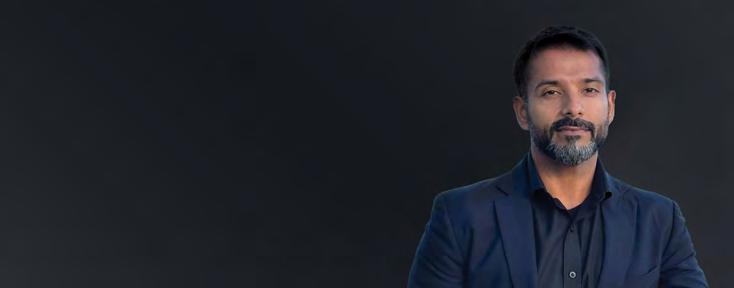
05:00 AM My day starts with morning rituals that include yoga, stretching, and meditation. This is a sacred time for me to set the tone. I then make a strong coffee and spend the next hour reviewing emails, addressing any critical matters, and mapping out the day. I also dedicate an hour to study. I recently completed my CTO certification with MIT and am actively exploring what my next educational commitment will be. Then I hit the gym by 7 AM.
08:00 AM I’m usually finishing up at the gym. Staying active is essential to how I operate –both physically and mentally. I’ve followed intermittent fasting for over two years, so I typically skip breakfast. It helps me stay focused and keeps my mornings productive without interruption.
09:30 AM I’m in the office. My mornings begin with alignment meetings across my digital and
growth teams. I’m currently leading three large digital transformation programs and one core growth initiative – all of which require structured planning and rapid iteration.
11:00 AM Mid-mornings are dedicated to deep work: overseeing tech implementations, reviewing strategy documents, following up on internal coordination, and supporting critical business functions. This window is where most of the cross-functional alignment happens.
01:00 PM Early afternoons are ideal for meetings – whether internal catch-ups or crossdepartment planning sessions. This is the most effective time to get focused attention from teams before their energy starts dipping later in the day.
03:00 PM By now, I shift focus to external development teams and tech consultants, most
of whom operate in earlier time zones. This window is productive for detailed reviews and decision-making. Around this time, I break my fast with a protein shake and supplements.
05:00 PM I start closing out the day, review progress across all digital tracks, and prepare notes for the next day. It’s also a time I use for strategy notes, idea development, and asynchronous check-ins with leadership.
07:00 PM I’m home and cooking – a ritual I value as much as my morning one. It’s a form of creative reset. I prefer fresh, whole meals and do my grocery planning over the weekend to avoid weekday distractions.
09:00 PM After a short walk by the water near my home, I wind down with a hot shower.
09:30 PM I’m asleep – ready to reset and do it all again.

